#margot strauss
Explore tagged Tumblr posts
Note
See the thing that bothers me about the team not helping Reid is how carefully they handled Strauss's alcohol addiction. Honestly I just feel like the whole plot wasn't resolved well with Spence but alas
tw for drug abuse and alcoholism below the cut
very different situations. hydromorphone appears on the DOJs list of controlled substances and alcohol does not.
the federal government has put a plan in place that very clearly provides steps that agents (for the sake of this conversation, we're talking about FBI agents) follow when they or another agent have an alcohol dependency. they started this operation in 1970 and it's continued since, with legislation passed in 1994 creating the employee assistance programs (EAP) and drug deterrence program (DDP). the EAP is what we see referenced in season 7 when morgan and hotch have their intervention with strauss. they have this in place so that these situations can be handled anonymously, providing for smooth transitions when recovering alcoholics are able to return to work. (there are many other reasons, of course)
since the creation in 1994 the EAP hasn't been expanded to provide assistance to agents who are addicted to drugs, like our beloved spencer reid. i don't think it's likely that the legislation will ever be expanded taking into consideration the US government's 'war on drugs' (which is a whole other can of worms). even marijuana, which is legal in 24 states and the district of columbia is on the controlled substances list, and smoking weed is still a fireable offense when you're in the FBI. the FBI won't even hire you if you've smoked weed within 12 months of your application date.
in the end, the story i see the most is that mgg asked for the plotline to be dropped. i also recognize that cable television in 2006 was likely not receptive to a drug addiction plotline.
12 notes
·
View notes
Text
youtube
MCE The Jaw Droppers 2023 #3: Barbenheimer
How anyone saw what was assumed to be at this point a year ago a slam dunk from Christopher Nolan becoming the 5 hour endurance test that would be embraced by many.
There were mashups, merch, explainers and plenty of support from both sides and others caught in the path of this non grind house double feature.
youtube
A feet that’ll likely never be equal.
Both do have something in common. They were the destroyer of box office worlds.
#barbenheimer#barbie#barbie movie#hi barbie#oppenheimer#margot robbie#ryan gosling#j robert oppenheimer#cillian murphy#robert downey jr#lewis strauss#double feature#counter programming#now i am become death#dance the night#can you hear the music#the jaw droppers#3#shocking moments#Youtube
5 notes
·
View notes
Text
'We Have Become Death
We f’d up,” are the simple, clarifying words of Mo Gawdat — author of Scary Smart and former Chief Business Officer at Google X — on a recent episode of the podcast The Diary Of A CEO with Steven Bartlett.
He was referring to the release of ChatGPT and similar Generative A.I. systems, which have exploded as the latest in a series of global crises we’ve been faced with in the last several years. An urgent open letter has been written by leaders in the tech industry requesting a “six-month pause” on experiments and advancements as they assess potentially catastrophic consequences. The Center for Humane Technology is racing to governments with a desperate plea to “regulate before it’s too late.” (You can see their talk on A.I. and its various implications here.) Members of Congress are pushing for an A.I. bill. And, the “Godfather of A.I.,” Geoffrey Hinton, exited Google with dire warnings. Collectively, the community behind the creation and dissemination of this iteration of A.I. is having what Gawdat calls its “Oppenheimer moment.”
If they are having such an (in relevant terms) immediate mea culpa, then the question becomes: Why proceed without caution before the release of this species-altering technology? The answer, as it turns out, is very similar to what J. Robert Oppenheimer contended with in the 1940s, and what Gawdat describes as the first inevitable: “X advance (a weapon, a new technology, A.I.) will happen… ‘because of the other guy.’”
In an interview with the New York Times, Dr. Hinton said, “I console myself with the normal excuse: If I hadn’t done it, somebody else would have.”
If I Don’t Do It, They Will
“The other guy” is a primary motivator for a host of human ills. For the most part, the people we know (personally) are human and flawed, but not psychopathic soul-sucking wormholes who seek the destruction of all they encounter. Yet, society at large often functions in a pathologically self-destructive manner. So there is some inherent disconnect between how we function in individual interactions, and the organizational and collective choices we make.
That break can be found in the avaricious, fear-based, survival impulse of the “other guy” ethos. “If I don’t do it, then they will.”
And, if that happens, I will lose: money, position, power, authority, and in the deepest recesses of our lizard brains, all resources and ability to survive.
It’s irrational, and makes us behave in ways that are counter to our long-term well-being. It reflects a deep distrust of our fellow man. It also indicates that we don’t have a lot of faith in our own ability to adapt and pivot with changing landscapes, while maintaining a focus on integrity and keeping things like generational well-being top of mind. Because sometimes the right thing to do in the face of a new technology is to go very slowly, or opt out entirely. The competitive, and fearful, instinct to rush ahead is also pathologically megalomaniacal, because, in this interpretation, the “I” is the only one worthy of holding real power.
In recent months, many of us have been pressured to implement tools like ChatGPT into our daily business activities: to test, learn, and master them as quickly as we can, always with the hope of gaining advantage over “the other guy” and with the baseline assumption that “if we don’t, they will.” But the reality is, in the long term (which few think of in the context of earnings reports), the other guy has just as much to lose as we do. But we’re scared, so we panic, and make moves that are too quick and with too little thought.
So what does any of this have to do with Oppenheimer or Barbie? Quite a lot as it turns out. Oppenheimer reflects the stagnant patterns of thinking that got us into this mess, Barbie is — both overtly and subtly — representing new ways to address problems, and a more collaborative leadership style that just may free us of the perils we, ourselves, have created.
Those warning against A.I. (largely leaders in the space) say that it is an extinction level risk as great, or greater than, nuclear weapons and/or global warming due to the staggering speed with which it is, can, and will evolve. (Yes, evolve, not advance.)
Why Oppenheimer? Why Now?
So shouldn’t we care about Oppenheimer’s story more than ever? Maybe. Maybe not. It depends on the interpretation — and director Christopher Nolan’s new film fails to embrace the moment. Oppenheimer (based on the book American Prometheus: The Triumph and Tragedy of J. Robert Oppenheimer by Kai Bird and Martin J. Sherwin) follows Cillian Murphy as the titular character in his early academic life through his work on the Manhattan Project — leading the charge in the creation of the atomic bomb. This is set against some explorations of his personal life, connections with the American Communist Party, and, importantly, two government hearings. One, a hearing in 1954 to determine his security status, and the second, Lewis Strauss’ Senate confirmation hearing for Secretary of Commerce in 1959.
One description of the film says it “thrusts audiences into the pulse-pounding paradox of the enigmatic man who must risk destroying the world in order to save it.”
That sentence is the essence of an alarming lack of personal responsibility on Oppenheimer’s part (a deficit that the film tacitly endorses). It also captures the rather heroic lens that is afforded the character. This isn’t a story about understanding how we allowed one of humankind’s greatest disasters to happen; it’s a film about the feelings (or lack thereof in interpersonal matters) of the man who ran the project to do so — half of which focuses on his hurt feelings after losing his security clearance years after said large-scale homicide of the citizens of Hiroshima and Nagasaki.
Oppenheimer’s security level forfeiture was primarily due to the paranoid and wounded feelings of a petty and small man: Strauss (played, admittedly, gorgeously by Robert Downey Jr.). Hours of screen time dedicated to a small-minded squabble in the telling of the choice to burn the world.
What should have been the essential focus of the story links to the excuse given for releasing and implementing Generative A.I. today: “the other guy” dynamic. Sadly, Nolan’s Oppenheimer isn’t so much interested in honing and questioning the validity of that reasoning, other than offering a brief mention of it. If anything, it leans into and plays up this dynamic sans investigation.
“We can’t let the Nazi’s make the bomb first.” That’s the entirety of the discussion regarding why they initiated the Manhattan Project.
What Oppenheimer Fails (Refuses) To See
A fair, and pretty hard to argue with, assertion… Yet, creating the weapon actually wouldn’t have necessarily prevented Germany from doing the same. So, what was the plan once both sides had it? Weren’t there other options? Like striking key research targets either via bombs or assassinations? How about kidnapping the scientists to our side?
These first few violent ideas aren’t necessarily advisable or viable. However, we might retroactively brainstorm the first bad ideas that come to my mind, because if we do that, eventually we’ll land on better ones. The point is we must not simply stop at “we have to” without doing the work of probing that premise thoroughly.
Because, ultimately, the Nazis lost before the completion of the Manhattan Project. However, as seen in Nolan’s Oppenheimer, Russia was able to make progress on an atomic weapon as a result of it — sending us into a Cold War and decades-long specter of mutually assured destruction. One which is still very much playing out on a global stage.
The U.S. was not wrong to do everything in its power to prevent the Nazis from gaining ground. At all. Nor was their motivation to “beat Germany to it” nearly as morally bankrupt as the “I’ll lose free-market competitive edge if I don’t release my potentially civilization-ending A.I. system before the other guys,” excuse that tech leaders used. What’s important to note is that the film breezes past the crucial question of “Why?” in favor of far less essential (and interesting) explorations.
The movie notes that the war was all but over by the time the weapon was actually, and sickeningly, deployed. However, again, it’s wishy-washy in its portrayal of accountability. It does little to question the U.S. having taken this action when they so clearly didn’t need to: choosing to rain fire on people who had nothing to do with the decisions that arrogant leaders made behind closed doors. Oppenheimer as a film is entirely non-committal about, nor seemingly deeply interested in, the essential parts of this story and what truly matters: personal responsibility in the face of global catastrophe.
Essentially, why we are the way we are and how we can be different.
It gives Oppenheimer an out by having him relay “both sides” of scientific opinion. Yet, he was in no way “neutral” in reality. Oppenheimer was in the rooms and a part of the discussions about which cities to target and did indeed have “blood on his hands.”
Again, the film fails to make much of this other than a cursory acknowledgement. In fact, we pointedly don’t ever see Japan or its citizens. Instead, we bear witness to a few heady sequences wherein Oppenheimer imagines destruction hitting his own home turf. Indeed, he chooses to look away from actual footage of the destruction in Hiroshima and Nagasaki — footage Nolan does not show the audience.
Okay, you don’t want to be exploitative, but you don’t have to be in order to acknowledge the lived experience of those who actually suffered.
Much of Oppenheimer is beautifully made, and it’s brimming with brilliant performances, centered by Murphy’s. But it’s laboriously — and unnecessarily — mired in flabby side-stories. Saliently are the issues of what it chooses to focus on.
It drags us through a story of a fight between Oppenheimer and those who would stymie his influence in Washington. Opposition that is centered largely on the respective egos of the players: Murphy’s Oppenheimer vs Downey Jr.’s Strauss. Essentially, Strauss wants to strip Oppenheimer of his security clearance in order to sideline his authority and damage his reputation. A large piece of Strauss’ motivation is that Oppenheimer embarrassed him once, and he (incorrectly according to the film) thinks Oppenheimer gossiped about him with Einstein.
This is so off the mark for a film like this.
If we want to watch an endlessly empathic and powerful depiction of how our base natures, traumas, and smallness drive the fate of humanity, we’ve got Succession.
What’s relevant here is that Oppenheimer (the movie) is choosing to focus on hearings that weren’t really all that consequential to anyone other than the people involved. Given his role in history, why bother? This is a creative choice that supports an egoistic focus on the centrality of an individual who is “larger than life,” which is fundamentally toxic at its core — because it outsizes the importance of “some” to the detriment of the many.
In other words, what Nolan sees as central to Oppenheimer’s story is this one man and his (fairly petty) needs. Not what he did, why he did it, the damage he created, and how we might, right now, choose something better.
Later, during a Congressional hearing to confirm (or deny) Strauss’ Cabinet appointment, Oppenheimer is effectively “vindicated” via testimony condemning Strauss’ role in Oppenheimer’s demotion. Ultimately, they are both “denied.” Oh, the humanity!
Real, perhaps. But is this the piece of this story we need, rather than the bigger picture of the ramifications of the atomic bomb on and for the world, as seen through a personal lens. If the Washington hearings-centric part of the film had touched on Mccarthyism in some new way, perhaps that might even make some sense. But they don’t.
This is in addition to time wasted on shallowly threaded themes about Oppenheimer’s romantic nature. Who cares if he’s a womanizer? That’s a bit irrelevant in the face of the start of the weapons that could still equal our collective demise. This is to say nothing of the poor use, and inexplicable nakedness, of international treasure Florence Pugh. There is waste everywhere in this film.
Perhaps there are some cries of “But it’s based on a book.” So what? It didn’t have to be. Nor did it have to adhere to that book sans imagination. It’s an adaptation of a life, whichever way you slice it.
Who and What Deserves Our Attention?
There is a decent (though, not revelatory) movie about building the bomb and wrestling with its consequences (the latter of which, again, there is shockingly little of) in about an hour and a half. An hour and a half that could have also easily humanized Oppenheimer, allowing us to understand more of what was driving him as it relates to the weapon, which, again, this film fails to depict in a manner we can sink our teeth into. Seemingly, it was his dream to work on a physics project in New Mexico. If that self-motivated goal is reason enough, well then, we have our answer on why we as a species may actually extinct itself.
There is a potentially great movie here, if the filmmakers had chosen excise all the (overwrought, though gorgeously shot) nonsense, and take that extra hour and a half (of a three-hour runtime) to focus on the depiction of a fully developed character who represents those global consequences via a specific story: The story of a specific (and known to us, the audience) Japanese citizen, seen in the same time periods that we follow Oppenheimer, until their lives inevitably, tragically, and profoundly consequently, collide.
That may have felt resonant.
Yet, Nolan’s choices inevitably default to what has been done before cinematically, rather than offering a new, and needed, perspective.
Once upon a time, we believed that the story of the creation of Facebook was about how Mark Zuckerberg outsmarted two hulky twins. But, it’s not that at all, as we’ve seen. It’s everything it wrought, which he didn’t stop. The story of a man overcoming his geekiness, having sex with lovely women, and succeeding professionally is just the story we’re used to. It’s not actually what’s meaningful — to us.
The fact that this film thinks that Oppenheimer’s reputational woes are what’s crucial says everything. The truth is, his feelings are irrelevant. As is whether he was an a**hole, or not. It’s of no consequence if he was wronged (maybe) by a man he accidentally humiliated. And discovering that he was vindicated in their little boy’s fight (and given a shiny medal for his efforts) is utterly devoid of value.
It’s all ego, ego, ego… What’s essential is that over a hundred thousand people died as a result of a terrible idea implemented by brilliant (yet staggeringly limited) minds, who wouldn’t listen to reason when they could have. We need to hear the stories of those people who lost their lives in an (entirely unnecessary) show of force. Only one reason is that their ancestors are likely the ones motivated to think through actual solutions for what we’re facing now.
But, Oppenheimer doesn’t care about them, and it’s got nothing new to say.
Do you want to know why filmgoers will know that the sequences featuring government procedural hearings are weighty and essential? (Oscar-worthy, even?) Because they’re shot on 70mm black and white film and have lots of (again, very good) acting. (In other words, it can’t wait to tell you just how important you need to understand that it is.) Its high-brow razzle dazzle at its best. But at its center, it’s just as devoid of crucial, fresh ideas as anyone saying, “We’ve gotta do it before the other guy does.”
Oppenheimer is outdated and clinging to the past in all the ways that are harmful, and avoiding innovation in the manner that matters to us if we’re to save this planet (or the human species): one of the mind and spirit. The film does not seem to have the ability to put its gaze anywhere other than the most obvious, and often least meaningful, targets.
Its worst crime is that it is structurally built to (cinematically) “sell” the successful test of the bomb as a triumphant moment. There’s lots of important and fast-paced walk and talks, a propulsive feel, setbacks, obstacles, and driving sound. Everything is (very well) designed to tell you that this is leading somewhere astonishing. Then, just before the bomb drops, silence… followed by the infamous recitation of the Bhagavad Gita line, “I have become death the destroyer of worlds.” Well, congratulations on a successful set up and sequence. There was clapping in my theater when the bomb hit.
Brava! Everyone gets to — soul-crushingly — miss the point together.
And the thing is, Christopher Nolan is too good of a filmmaker not to understand the tension that he was building and releasing. This was meant to feel like an achievement, and we’re trained (by what we’ve watched previously) to subconsciously interpret that as “good”: a positive outcome. He could have just as easily used the tools of cinematic storytelling at his disposal to subvert that, and deliver a different (better) conscious and subconscious message to the audience.
As to that now-famous line, some say that Oppenheimer was effectively proclaiming himself a God. While others say he meant he was “compelled by the God/new power nuclear energy to be a force of destruction.” Neither is true. He was a man who made bad choices.
There were scientists that didn’t take part in the project, and later, many who advocated against using the bomb, particularly with the war all but over. Oppenheimer made neither of those choices. In fact, as the film depicts, there was an “almost zero” possibility (meaning some degree of potentiality) the bomb would have ignited the atmosphere, quite literally destroying all of the planet just in the testing phase. Again, a phase they reached when they were already pretty much victorious, and certainly the Nazis weren’t getting a bomb of their own. Yet, they pressed on, without the knowledge or consent of the very lives they risked.
At one point in this film Oppenheimer’s wife (played by Emily Blunt) says of death related to his infidelity, “You don’t get to commit the sin and then have us feel sorry for you that there were consequences.” This is as close as the film gets to holding him accountable, and it really is a cop out. Because, Oppenheimer (the film) does want us to feel sorry for him in the end. Again, over a really petty gripe that equalled him losing some privilege.
Perhaps this film isn’t asking the truly salient questions because the creators aren’t able to step outside of their own embedded systems to know that there are more important questions. In other words, they’re taking it as a given that Oppenheimer had no choice, and was acting, therefore, heroically — and again, the film structurally sets us up to see him in this light. If that’s the case, then we need creators, and thinkers at large, who are able to open the door to better, more useful questions and perspectives. Those who won’t take norms as a given. Because the norms we currently have are driving us on an inevitable path to our own end.
These aren’t just stale notions: they’re going to, quite literally, destroy us.
Barbie and the Art of Being Relevant, With a Sense Of Humor
It would be unimaginable to propose that Barbie (the film, not the literal world-polluting plastic doll nor the cultural symbol that attacked women’s sense of self for decades) is the solution to the problems that Oppenheimer, and his ilks’, thinking created. (But what if we did?)
We frequently dismiss the most relevant aspects of our lives as being less so, because they don’t come with the grave approval or consideration of an (imagined or real) outside validating source. We may limit the investment in our relationships in favor of our careers, and so on. How often do we undermine something, naming it fluff, because, at its core, it’s joyful — and centered on the heart?
The basic premise of Barbie, the film, is that things are all but perfect for “Stereotypical” Barbie (Margot Robbie) in Barbieland. Though not so much for Ken (Ryan Gosling), who is — along with the other Kens — all but an accessory to the primary dolls (the Barbies). When Robbie’s character starts to experience inexplicable (human) flaws, she must travel to the “real world” to seek the girl who is playing with her, and thus creating this unwanted frailty. Ken decides to travel with her, and discovers the joys of the patriarchy.
A battle for Barbieland, and for their individual and collective identities, ensues.
Barbie is a genuinely brilliant, funny script that is executed with a stunningly deft hand. It also has something real to say, and a novel approach to do so. Two hundred writers could have walked into a general meeting with Mattel and walked out with a solid take on a story, which may or may not have generated an entertaining film that sold dolls. What co-writer and director Greta Gerwig’s film is doing is adding to a real conversation that has implications well beyond anything as limited (and, candidly, condescending ) as “girl-power.”
It’s been fascinating to see the various takes on “what myth” the film is telling. Is it the hero’s journey, or the heroine’s? There’s one interpretation that makes note of some interesting links to the myth of Inanna (the story of a Queen reclaiming her throne after a visit to the underworld).
The truth is, Barbie can’t be boxed in (yep) that way, because it contains aspects of various mythological stories and structures, while also boasting of a (Oscarcast-worthy) dance number, and perhaps the best Snyder cut joke to date. We won’t go too far down the rabbit hole with either the hero or heroine’s journey, here, but a (very stripped down) focus for the sake of this piece is that the hero’s journey offers a bit more in terms of receiving external accolades and rewards in the end (as one point of distinction). The heroine’s journey, in a very broad sense, kind of picks up where that leaves off.
After abandoning femininity in favor of masculine systems, the protagonist attains a certain level of cultural achievement and says, “Huh, I have all this stuff. I was a part of the system… Now what?” This brings on a crisis in which they ultimately ask, “How do I integrate the depths of myself and my soul with ideas of external reward and cultural significance?” It’s more complex, but one thing it’s asking us to think about is: “What does happiness truly mean and look like to me as my most complete self?” And, importantly, outside of the context of cultural validations such as money, ego-driven success, and accolades.
Barbie is a movie that celebrates humanity in all its simple, sometimes ugly, often easily missed glory, as seen through the eyes of a doll meant to represent an idealized version of it. There are several sequences in which Robbie’s Barbie soaks in the subtle, and not so subtle, pieces of joy available to us every day if we look for them (and aren’t distracted by pain-causing drives): the wind in the trees, laughing with family, the sunshine while waiting for a bus, and the face of a woman who is old enough to have seen it all, and love herself through it.
This is important, because, as noted, the ambition to win (often financially, but also in other respects) at all costs has stripped of us our ability to act in accordance with our own, long-term, interests. Barbie, effectively, suggests that we slow down and put our eyes back on what’s truly essential.
The heroine’s journey is about coming into our own sense of self, fully, putting external drives in their proper place, and in so doing, changing the world around us. What’s interesting about this film is that a number of characters experience this transformation, perhaps most centrally Robbie’s Barbie and America Fererra’s Gloria (a mom who works for Mattel and is struggling with the loss of connection with her teen daughter). There is also an element of healing the mother/daughter split that is present in the heroine’s journey, which Ferrera’s character embodies, along with Ariana Greenblatt’s Sascha, her daughter. The point is, multiple characters are taking their own hero and/or heroine’s journey, which impacts the whole. It’s the intersection of the community and (true) individual good that saves the day in this film.
(Interestingly enough, this last season of the Max comedy The Other Two really captured the heroine’s journey.)
Barbie doesn’t actually fall squarely into the trajectory of the hero or heroin’s journey, and that’s part of the film’s brilliance. The heroine (in that mythological structure) must travel into her darkness, the underworld, and her shadow. (The hero must do some of this as well, of course, it’s simply more central in the heroine’s journey.) Barbie’s underworld is our world, the “real” world, where she must face the consequences of the pain she (as an idol) inadvertently caused. Barbie, the film, is subversion and acknowledgment of what that symbol has meant in the world, as seen through a specific, individual lens.
This is part of personal responsibility. Truly owning — feeling — the pain we have caused. Of course, Barbie also doesn’t have the immediate answer for this pain. Nor should she. She needs the wisdom of those who suffered from it, among others.
Robbie’s Barbie is very reluctantly called to action and to leave her comfortable existence (as in the hero’s journey). She’s compelled, quite literally, by a force outside of herself. But, it’s not because she is the sole savior of this — or any — world. Quite the opposite.
This is a movie that is, in many ways, about cooperative leadership and co-owned responsibility. In Barbieland, there are the structures of our world: the President, lawyers, doctors, authors, and so on. However, there is a fluidity to how they step into leadership, based on need and available expertise.
Matriarchy or Patriarchy?
In terms of the myth of Inanna, there are some fascinating parallels. Barbie must travel to the underworld (Los Angeles) and reckon with her own objectification, and loss of (overt) power. While there, Ken, who has no sense of purpose or authority in Barbieland separate from the Barbies, becomes enamored — and frequently confused about — symbols of masculinity: like horses, and, as Clueless so aptly put it, complaint rock.
Ken returns these ideas to Barbieland, upending their order, and implementing the manosphere version of the patriarchy. So, he’s kind of the worst for that section of the film. However, in many ways, understandably so, having been so disempowered previously. This is one of the insights that the film is offering, which a lesser story may not have.
There is a key distinction between this film and the Inanna myth, and it’s salient to what Barbie (the movie) is getting right. Margot Robbie’s Stereotypical Barbie is not reclaiming her own throne. Not entirely. She’s actually giving it to the rightful person. The leader of Barbieland is Issa Rae’s President Barbie, not Stereotypical Barbie. The reclamation is for all of the women who have been displaced, not just herself.
Importantly, Stereotypical Barbie isn’t able to accomplish this on her own. In fact, she’s entirely shut down until America Ferrara’s Gloria steps in. When Gloria feels doubt in her ability to succeed in saving the Barbies’ world, her daughter says “we have to try, even if it’s not perfect.” That’s likely a choice point for many of us at this time in our history, where action seems futile, but we must try anyway. Gloria chooses to accept that calling, and in so doing, she becomes the primary driver of the rescue mission. Though again, all of the Barbies (including Robbie’s) must actively participate in order for them to be successful.
Gloria is also the one who called Barbie to the real world initially, as she was experiencing a devastating split with her daughter and sense of place in the world. She activated an initiation for herself, for Barbie, and both of their worlds, all born of a desire to create a greater union, rather than a desire to advance the self or ego. The pain of those circumstances earned Gloria the wisdom she needed in order to activate, awaken, and re-empower all the Barbies. They, in turn, have the humility to listen to one who has experienced what they have not, but have (inadvertently, perhaps) been a part of creating.
In the end, there’s a joke in which Rhea Perlman’s character calls Robbie’s character “Self-Effacing” Barbie, because Robbie acknowledges that she didn’t, singularly, save the day or create a change.
It actually matters that we engage with this healthy level of humility, because no one person — or persons — will solve the existential reckoning we’re in. This is going to take a radical shift in how we perceive polarities like the individual and the collective. This kind of thinking is in direct opposition to the Oppenheimer-esque point-of-view that “only I am qualified,” (I being an individual, a nation, or a company) and “if I don’t do it, then…”
In the end, Stereotypical Barbie exits Barbieland. She doesn’t return home to rule as in the hero’s journey (or the Inanna myth). She chooses her humanity. She selects this world (in all its mess), rather to remain an ideal. She wants to have the ideas, rather than be one. The last moments of the movie solidify its genius. Because it wasn’t about Barbie becoming a CEO, or world leader, or gaining some other validating title. Rather, the focus was on her embracing a very human, often humiliating (though necessary), deeply vulnerable, and ultimately life-affirming medical need: tending to her pussy.
As to “the bad rap” that Barbie is giving men, this feels like a misreading. If anything, Barbie makes the point that a sure sign that you’re still trapped in the patriarchy is the idea that the antidote to it is the inversion: the creation of an imagined, utopic matriarchy.
The Kens are infantilized and disempowered to the degree that they are dangerous (and sad). They don’t represent men in total. They represent men out of alignment with their own dignity. Just as the Barbies, once infected with the patriarchy (which is just a system like any other, and does not represent every member of said system) are disconnected from their grace and intelligence. Barbieland isn’t a utopia and the problems haven’t been solved. It’s not an aspiration. It’s simply a mirror.
The answer to the life and death crossroads we face today isn’t to invert our systems. It can’t be found in thinking that small. Every one of us (no matter our job or role in life) is faced with daily questions as consequential as, “How do I make an ethical choice in an inherently unethical system?”
As such, we must find a path forward that looks unlike any we’ve tread before. And a “dream land” or house, or imagined intellectualized paradise that discounts our essential humanity isn’t going to cut it. Barbie actually gets this.
We’ve Got Questions, Barbie’s Got Answers
Solutions to embedded problems aren’t going to be found with the same thinking that created them — a true pattern interrupt is needed. So, it’s equally unlikely that the people who are thriving in these systems will be the cure for them. At least not on their own, and without the benefit of those who have new ideas. Ideas that were born because the people offering them have needed to develop ways to exist without the immediate benefits of our current structures. In other words, those outside of the system. Also, possibly, just everyday people, as Barbie proposes via America Ferrera’s character.
In the movie version of life where a tidal wave shatters Los Angeles and 13 very special and important people get on a ship, I have no illusions about where I’d be. I’m drowning in that wave with everyone else. But perhaps it’s people like us who can help spark some ideas. Because we’re not getting on that ship, we’re motivated to do so.
I’d also make the argument that it’s also the more “important” one. We should not disregard the knowledge of those who created these A.I. (and other) tools as they ring alarm bells now. However, if they’d had true wisdom, would they have created and deployed these technologies in the first place? Would they not have, possibly, found a different, as yet unforeseen path? One that does not fall back on the excuse of, “but the other guys” as if that’s the flat bottom of human thinking and capability. They’re far too smart to truly believe that, and too brilliant not to have been able to predict the perilous outcomes.
They simply chose to move ahead anyway. Yes, they must be part of the solution, but not all on their own, and without input from the very lives they are already negatively impacting. They’ll have to take their medicine just like Barbie did straight from a ruthless adolescent mouth.
A movie, like Oppenheimer, dedicated to one such person’s angst about his own ruinous work isn’t what we need. Worse still, a movie that is largely about his unrelated angst. His egoic emotions aren’t useful to explore. We’re all too familiar. What’s at issue is an entire culture reformed in the face of the atomic bomb.
Barbie calls the status quo on its crap and offers a new vision. Oppenheimer is not only upholding — but clinging to, and celebrating — a status quo that has brought us to a crushing confluence of crises. Simply in the design of the film, in who it centers, in the way it’s constructed, it is doing that. The single man, with such weight on his shoulders… (Who in reality needed scores of people and support to “achieve” what he did.) This film is the essence of the systems that got us here.
Barbie, however, is a film that is at once scathingly funny, deeply loving, an expression of awe in the face of the mundane, about the individual in collaboration with community as the solution to ills, and the embodiment of a number of rooted cultural myths.
When all is said and done, Barbie really is just the better movie. There is also an argument to be made that it’s the more “important” one.'
#Oppenheimer#Barbie#A.I.#Christopher Nolan#Margot Robbie#Ryan Gosling#Ken#Emily Blunt#Kitty#American Prometheus: The Triumph and Tragedy of J. Robert Oppenheimer#Kai Bird#Martin J. Sherwin#Cillian Murphy#Robert Downey Jr.#Lewis Strauss#Florence Pugh#Bhagavad Gita#America Ferrera#Gloria#Mattel#Greta Gerwig#Rhea Perlman#Issa Rae
4 notes
·
View notes
Text




Greta killin it!😛
#barbie#margot robbie#greta gerwig#stanley kubrick#2001: a space odyssey#also sprach zarathustra#richard strauss#barbie spoilers
1 note
·
View note
Text







Colon Theatre
The Teatro Colón in Buenos Aires is one of the most important opera houses in the world. Its rich and prestigious history, as well as its exceptional acoustic and architectural conditions, place it on par with theaters such as La Scala in Milan, the Paris Opera, the Vienna State Opera, Covent Garden in London, and the Metropolitan Opera in New York.
In its first location, the Teatro Colón operated from 1857 to 1888 when it was closed for the construction of a new venue. The new theater was inaugurated on May 25, 1908, with a performance of Aida. Initially, the Colón hired foreign companies for its seasons, but starting in 1925, it had its own resident companies - Orchestra, Ballet, and Choir - as well as production workshops. This allowed the theater, by the 1930s, to organize its own seasons funded by the city's budget. Since then, the Teatro Colón has been defined as a seasonal theater or "stagione," capable of fully producing an entire production thanks to the professionalism of its specialized technical staff.
Throughout its history, no significant artist of the 20th century has failed to set foot on its stage. It is enough to mention singers such as Enrico Caruso, Claudia Muzio, Maria Callas, Régine Crespin, Birgit Nilsson, Plácido Domingo, Luciano Pavarotti, and dancers like Vaslav Nijinsky, Margot Fonteyn, Maia Plisetskaya, Rudolf Nureyev, and Mikhail Baryshnikov. Esteemed conductors such as Arturo Toscanini, Herbert von Karajan, Héctor Panizza, and Ferdinand Leitner, among many others, have also graced the theater. It is also common for composers, following the tradition initiated by Richard Strauss, Camille Saint-Saëns, Pietro Mascagni, and Ottorino Respighi, to come to the Teatro Colón to conduct or supervise the premieres of their own works.
Several top-notch maestros have worked consistently here, achieving high artistic goals. They include Erich Kleiber, Fritz Busch, stage directors like Margarita Wallmann or Ernst Poettgen, dance masters like Bronislava Nijinska or Tamara Grigorieva, and choral directors like Romano Gandolfi or Tullio Boni. Not to mention the numerous instrumental soloists, symphony orchestras, and chamber ensembles that have offered unforgettable performances on this stage throughout over a hundred years of sustained activity.
Finally, since 2010, the Teatro Colón has been showcased in a restored building, resplendent in all its original splendor, providing a distinguished setting for its presentations. For all these reasons, the Teatro Colón is a source of pride for Argentine culture and a center of reference for opera, dance, and classical music worldwide.
__________________________________________________________
You will need a 64x64 lot and the usual CC from TheJim, Felixandre, Harrie, Sverinka, SYB, Aggressivekittty, and other marvelous creators!
DOWNLOAD TRAY: https://www.patreon.com/user?u=75230453
(free to play 7/17)












#sims 4 architecture#sims 4 build#sims4palace#sims 4 screenshots#sims4#sims4play#sims 4 historical#sims4building#sims 4 royalty#sims4frencharchitecture
73 notes
·
View notes
Text
"put a song for every letter in your url and tag the amount of people in your url"
thank you @eeuwigestilte for tagging me in this ^_^
you will notice quite a bit of artist repetition:
violin concerto in a minor (kolja blacher & cologne chamber orchestra)
i'm simply crazy over you (sam ash & louise macmahon)
come josephine in my flying machine (ada jones & billy murray)
they start the victrola (billy murray)
oui oui marie (arthur fields)
rhapsody in blue (leonard bernstein & columbia symphony orchestra)
the honeysuckle and the bee (belle davis)
after the ball (george j gaskin)
les amants de paris (édith piaf)
k-k-k-katy (billy murray)
i'm afraid to come home in the dark (billy murray)
narcissus (victor concert orchestra)
glüwürmchen idyll (will kalinka & paul godwin orchestra)
margot coeur gros (édith piaf)
an der schönen blauen donau (andré rieu & johann strauss orchestra)
cri du coeur (édith piaf)
he'd have to get under—get out and get under (billy murray)
i'm goin' to settle down outside of london town (billy murray)
non, je ne regrette rien (édith piaf)
eden blues (édith piaf)
20 tags: @ahotjanuary @bumblingest-bee @busg @crescentmp3 @dilbobloggins @drinkthemlock @dualclock @freddiegoesmetal @koiketto @locomotivefan @magnoliae @orangegloom @porciaenjoyer @riddled-forensic @spring-heeledjack @strangestcase @thereddenedking @troyandabedsnewapartment @verae @wiredalienvampire
11 notes
·
View notes
Text
Amid a desert landscape a visionary unveils an invention that will forever change the world as we know it.
That’s the climactic scene of the Christopher Nolan biopic Oppenheimer, about the eponymous J. Robert Oppenheimer, the “father of the atomic bomb.” It’s also the opening scene of the Barbie movie, directed and co-written by indie auteur Greta Gerwig, which opened on the same day as Oppenheimer.
Despite the two films’ radically different subject matter and tone—one a dramatic examination of man’s hubris and the threat of nuclear apocalypse and the other a neon-drenched romp about Mattel’s iconic fashion doll—they have far more in common than just their release date. Both movies consider the complicated legacies of two American icons and how to grapple with and perhaps even atone for them.
In Oppenheimer, the desert scene depicts the Trinity test, the world’s first detonation of a nuclear bomb near Los Alamos, New Mexico, on July 16, 1945. A brilliant but flawed theoretical physicist and the rest of his team work frantically to develop the weapon for the United States before the Nazis can beat them to the punch; they then gather on bleak, lunar-white sands near their secret laboratory to test the terrifying creation.
The countdown timer ticks to 00:00:00, the proverbial big red button is pushed, and a blast ignites the sky—a blinding white flash that quickly morphs into a towering inferno. Everything goes silent as Oppenheimer stares in awe from behind a makeshift protective barrier at what he has created.
Suddenly, he begins experiencing flashes of a different kind, premonitions of the human horror and suffering his weapon will wreak. Nolan is unambiguously signaling to the audience that this is a pivotal moment for the world, and for Oppenheimer personally, as what was once merely a theoretical idea has become monstrously real. The fallout, both literally and figuratively, will be out of Oppenheimer’s control.
Barbie’s critical desert scene comes not at the film’s climax but at its very beginning. The movie opens with a parody of the famous “The Dawn of Man” scene from Stanley Kubrick’s classic 1968 science fiction film, 2001: A Space Odyssey. As a red-orange sunrise breaks across a rocky desert landscape, a voiceover (from none other than Dame Helen Mirren) begins: “Since the beginning of time, since the first little girl ever existed, there have been dolls. But the dolls were always and forever baby dolls.” On screen, underscored by the ominous notes of Richard Strauss’s “Also Sprach Zarathustra,” little girls sit amid dusty canyon walls playing with baby dolls.
“Until…” Mirren says. And then comes the reveal: The little girls look up to see a massive, monolith-sized Margot Robbie, dressed in the black and white-striped swimsuit of the very first Barbie doll. She lifts her sunglasses and winks. The little girls are stunned—and, like the apes in the classic sci-fi movie, they begin to angrily dash their baby dolls against the ground.
This is Barbie’s mythic origin story: Once upon a time, little girls could only play with baby dolls meant to socialize them into wanting to be good wives and, eventually, mothers. Then came Ruth Handler, who in 1959 decided to create a doll with an adult woman’s body, adult women’s fashions, and adult women’s careers so that little girls could dream of being more than just wives and mothers. And the rest is history. Thanks to such iterations as doctor Barbie, chef Barbie, scientist Barbie, professional violinist Barbie, and beyond, Barbie opened up young girls to a world of possibilities and, Mirren says, “All problems of feminism and equal rights [were] solved.”
Well, not so fast: Mirren adds one final, snarky beat: “At least,” she says, “that’s what the Barbies think.”
Thus Gerwig introduces the central tension that animates the movie: Handler set out to create a feminist toy to empower and inspire young girls. But we sitting in the audience in 2023 know that things worked out a little differently. In the intervening years, Barbie would come under fire from feminists and other critics for a whole host of sins: encouraging unrealistic and harmful beauty standards that contribute to negative body image issues, eating disorders, and depression among pre-adolescent girls; lacking diversity and perpetuating white supremacy, ableism, and heteronormativity; objectifying women; promoting consumerism and capitalism; and even contributing to greenhouse gas emissions.
And here is the core parallel between Barbie and Oppenheimer: Two iconic American creators who ostensibly meant well but whose creations caused irreparable harm. And two iconic American directors (Nolan is British-American) who set out to tell their stories from a very modern perspective, humanizing them while also addressing their harmful legacies.
But while Nolan obviously had the much harder task—no matter how much harm you think Barbie has done to the psyches of young girls over the years, there’s simply no comparison to the human toll of the bombing of Hiroshima and Nagasaki, the environmental impact of decades of nuclear testing, or the cost of the nuclear arms race—oddly enough, it’s Gerwig who ends up taking her job of atonement far more seriously.
As its opening scene shows, the Barbie movie lets the audience know right from the start that it’s self-aware. It knows that Barbie is problematic. And it’s going to go there.
And it does—almost to the point of overkill. The basic plot of the movie is this: Barbie is living happily in Barbie Land, a perfect pink plastic world where she and her fellow Barbies run everything from the White House to the Supreme Court and have everything they could ever want, from dream houses to dream cars to dreamy boyfriends (Ken)—the last of which they treat as little more than accessories.
But suddenly, things start to go wrong in Barbie’s happy feminist utopia, and to fix it, she is forced to journey into the real world—our world—accompanied by Ken, who insists on going with her. When she does, she realizes that contrary to what she believed (as Mirren told us in the opening scene), the invention of Barbies didn’t solve gender inequality in the real world. In the real world, Barbie is confronted not only with the dominance of the patriarchy (she discovers, for instance, that Mattel’s CEO is a man, played by Will Ferrell), but also with the fact that young girls seem to hate her.
In a crucial early scene, Robbie’s Barbie encounters ultracool Gen-Z teen Sasha (played by Ariana Greenblatt), who delivers a scathing monologue about everything that’s wrong with Barbie, the doll and cultural symbol—basically a checklist of all the criticisms lobbed at Barbie over the years, from promoting unrealistic beauty standards to destroying the planet with rampant capitalism. Barbie is crestfallen.
Meanwhile, there’s a subplot involving Ken’s parallel discovery of patriarchy, and how awesome and different it seems to be from his subjugated life in Barbie Land. Ken proceeds to go full men’s rights, heading back to Barbie Land and seizing power. He transforms Barbie’s dream house into Ken’s Mojo Dojo Casa House, where Barbies serve men and “every night is boys’ night!”
Barbie enlists the help of Sasha and her mom (played by America Ferrera)—a Mattel employee who secretly dreams up ideas for new, more realistic Barbies such as anxiety Barbie—to unseat Ken and restore female power in Barbie Land. Along the way, Ferrera’s character delivers the film’s other major feminist monologue, about how hard it is being a woman in the real world.
The monologues are unsubtle, as are the repeated mentions of concepts like the patriarchy. In every scene and nearly every line, the movie hits the audience over the head with the pro-feminism message. Gerwig knows what her job is—to atone for Barbie’s sins (and, yes, help Mattel sell more dolls)—and she makes sure everyone knows that she has fully understood the assignment.
But it’s in the film’s quieter, more tender moments that Gerwig’s background as an indie filmmaker and her true talent shine through, and where she’s able to communicate the message in a subtler, but ultimately more impactful, way. The scene where Barbie in the real world sees an elderly woman for the first time (old people and wrinkles don’t exist in Barbie Land, obviously) and is stunned at how beautiful she is, wrinkles and all. Or the scenes where Barbie talks quietly with her deceased creator, an elderly Handler (played by Rhea Perlman), who explains that the name Barbie was an homage to Handler’s daughter, Barbara, who inspired her to make the doll.
The overall result is a movie that, even if a bit ham-fisted in its over-the-top messaging, doesn’t shy away from the uglier parts of Barbie’s legacy. It looks them right in the face, wrinkles and all.
I said above that the Trinity test scene is the climactic scene in Oppenheimer, but that’s not really the case. For a movie about the complicated life and legacy of the man credited with creating the world’s most destructive weapon, it should be the climax. You might imagine it would follow with a denouement of the inventor confronting the reality that his creation is used to kill tens of thousands of Japanese civilians and sparks an arms race that threatens to destroy all of humanity.
These scenes are in there, but they are given short shrift next to the other story Nolan wants to tell: that of how Oppenheimer, once considered an American hero, was mistreated by his country in the postwar years. As McCarthy-era fears of communist infiltration grip the country, Oppenheimer’s previous ties to the Communist Party (he never joined the party himself, but he had close family members and friends who were members, and he supported various left-wing causes) are mysteriously brought to the FBI’s attention despite already being well documented. His security clearance is revoked, and his career working with the U.S. government on nuclear issues ends.
It is this storyline—not the apocalyptic destruction of two Japanese cities—that is given the most pathos. Much of the movie’s three-hour run time—and nearly all of its third act—centers on what we are clearly meant to see as the great evil that was done to this man who did so much for his country. The real climax of the film is not the Trinity test, nor even the bombings of Japan (which are not even shown in the movie), but rather the moment we learn who betrayed Oppenheimer by handing over his security file to the FBI.
This is the shocking revelation that is meant to induce gasps in the audience, not the images of charred and irradiated bodies. In fact, those images aren’t even shown to us, the viewers. In the scene where Oppenheimer and his team are shown photos of the aftermath of Hiroshima and Nagasaki, the camera stays tight on Oppenheimer’s face as he reacts to the images—a reaction that consists of him putting his head down to avoid seeing them.
It is an act of cowardice on Oppenheimer’s part, yes, but also on Nolan’s. Indeed, the only glimpses we get of the macabre effects of the atom bomb take place in Oppenheimer’s fevered imagination, and even then, they are brief flashes used for shock value: skin flapping off the beautiful face of an admiring female colleague; the charred, faceless husk of a child’s body Oppenheimer accidentally steps on; a male colleague vomiting from the effects of radiation. Of the Japanese victims, there is nothing. They remain theoretical, faceless.
Nolan has said that he chose not to depict the bombings of Hiroshima and Nagasaki not to sanitize them but because the film’s events are shown from Oppenheimer’s point of view. “We know so much more than he did at the time,” Nolan said at a screening of the movie in New York. “He learned about the bombings of Hiroshima and Nagasaki on the radio, the same as the rest of the world.”
But in reading the numerous interviews he’s given about the movie, it’s also clear that Nolan fundamentally sees Oppenheimer as a tragic hero—Nolan has repeatedly called Oppenheimer “the most important person who ever lived”—and Oppenheimer’s story as a distinctly American one. “I believe you see in the Oppenheimer story all that is great and all that is terrible about America’s uniquely modern power in the world,” he told the Bulletin of the Atomic Scientists. “It’s a very, very American story.”
That Nolan’s film devotes so much runtime to Oppenheimer’s point of view and how he was tragically betrayed by his country is partly due to the fact that the film is not an original story but rather an adaptation of the Pulitzer Prize-winning biography of the great scientist, American Prometheus: The Triumph and Tragedy of J. Robert Oppenheimer. That book also places Oppenheimer being stripped of his security clearance at its center. But that didn’t mean Nolan had to do the same in his adaptation. That was a choice. And the end result is what military technology writer Kelsey Atherton aptly described as “a 3 hour long argument that the greatest victim of atomic weaponry was Oppenheimer’s clearance.”
At a time when Americans are struggling to reckon with their country’s past and how it has shaped the present—from fights over how (or even whether) to teach children about the legacy of slavery and Jim Crow; to debates, including in these very pages, over the role (or lack thereof) of NATO expansion in Russia’s decision to wage war on Ukraine; to retrospectives on the myriad failures of the U.S. war in Afghanistan; and beyond—the fact that the two biggest films in theaters right now are attempting to confront the legacies of two American icons, the nuclear bomb and Barbie, is understandable and perhaps even impressive.
But the impulse to look away from the ugliest parts of those legacies remains strong, and Oppenheimer never fully faces them.
24 notes
·
View notes
Text
another random post about headcanons of mine for some asoue characters...their neftlix’s counterparts, that is:
netflix!mrs. quagmire is a quagmire by blood, with her mother being a former denouement. this makes netflix!mrs.quagmire a cousin to denouments. her full name is angela margot quagmire (as for why i picked angela, angela is isadora duncan’s actual first name).
netflix!mr. quagmire married into the quagmire family. his full name is quincy george oscar, nee bluth (george oscar bluth is a reference to the actor’s role on arrested development).
angela was once a pilot/aviator, but by asoue she’s a pilot/aviator instructor. angela uses her skills whenever on vfd missions though, because somehow, it’s always needed at one point.
quincy is an attorney. a defense lawyer in fact, and always has the luck of getting his always innocent’s clients a not guilty verdict, and getting justice strauss as the judge on his cases.
netflix!gregor was the original sugar bowl(tm) owner. he gave the sugar bowl(tm) to esme, believing she can keep it safe (being rich and beautiful, no one will suspect her). gregor needing it back for his research more or less help pave way to opera night(tm) and the schism itself.
netflix!ike has a small collection of hats, ever since he was a child. his favorite hat is the cowboy hat.
netflix!josephine was a j.s. prior to her marriage (maiden name is seymour). josephine considered keeping her maiden name after marrying ike, but she grew fond of the anwhistle surname.
#asoue#a series of unfortunate events#netflix asoue#asoue netflix#mrs. quagmire#mr. quagmire#gregor anwhistle#ike anwhistle#josephine anwhistle#headcanons
9 notes
·
View notes
Text
Margot Le Roux Vaütteri, uma antropóloga recém-formada pela prestigiada Universidade de Dartmouth, cuja paixão pelas culturas e narrativas humanas a levam a explorar os confins do mundo em suas pesquisas. Inspirada pelas palavras de Claude Lévi-Strauss, que afirmou que "o mundo começou sem o homem e terminará sem ele, mas no intervalo, podemos aprender algo sobre a nossa condição", Margot dedica-se a desvendar os mistérios das tradições, costumes e modos de vida das comunidades que encontra.
Em colaboração com a Dartmouth, a romena embarca em um projeto de pesquisa internacional que a guia por paisagens diversas, desde sociedades indígenas preservadas até as metrópoles pulsantes da modernidade. Sua abordagem, profundamente enraizada na empatia e na curiosidade, revelam as sutis nuances das estruturas culturais e sociais, refletindo a complexidade da condição humana que Michel Foucault tão eloquentemente descreveu.

Para compartilhar suas descobertas e aventuras, Vaütteri criou este blog como uma tessitura de suas experiências de campo, entrelaçando as histórias das pessoas que conhece com as lições profundas que extrai de cada encontro. Não se trata apenas de um diário de viagem, mas de um compêndio rico em conhecimento antropológico, um tributo à diversidade humana que é tanto uma inspiração quanto uma provocação intelectual para os leitores.
Acompanhe Margot em sua jornada e descubra o mundo sob a lente de uma antropóloga apaixonada e dedicada. Suas narrativas prometem enriquecer a compreensão sobre as complexidades e belezas da vida humana. Sua escrita poética e erudita oferece uma reflexão profunda sobre a interconexão das culturas e a eterna busca pelo entendimento do que nos torna verdadeiramente humanos.

1 note
·
View note
Text
let the war begin
#poll#polls#oppenheimer#barbie#cillian murphy#ryan gosling#margot robbie#robert downey jr#florence pugh#christopher nolan#ken#barbie 2023#barbie the movie#barbie movie#oppenheimer 2023#lewis strauss#greta gerwig#emily blunt#simu liu#emma mackey#tumblr poll#tumblr polls#film#films#movie#movies
93 notes
·
View notes
Text
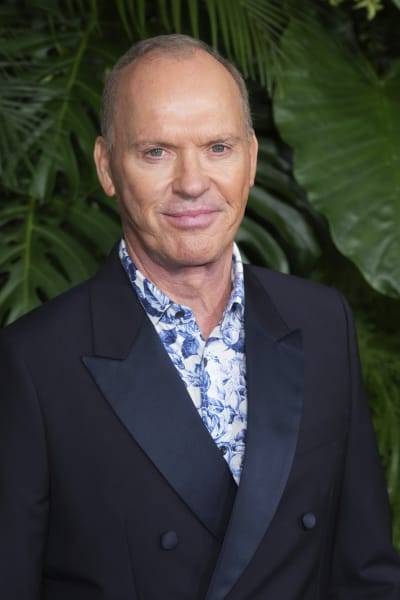

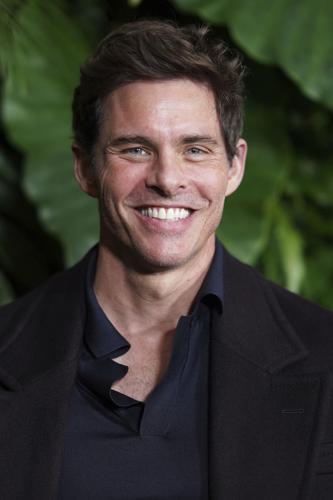
James Marsden, Michael Keaton, Margot Robbie, and more celebrities arrive at Chanel's 15th Annual Pre-Oscar Awards Dinner on Saturday, March 9, 2024, at the Beverly Hills Hotel in Los Angeles. Photos: Jordan Strauss - invision, Jordan Strauss/Invision/AP. Sources: Invision, Goshen News and MSN
2 notes
·
View notes
Text
mobile must list.
* full muse bios can be found here
dc comics. · arden waverly. professional hacker. fc ; kristen stewart · brooke larson. escort. fc ; sophie cookson · emily wayne. college student + heiress. fc ; abigail cowen · gia tedesco. real estate agent. fc ; danielle campbell · jenna wilder. hotel heiress + trust fund baby. fc ; sabrina carpenter · larken forrest. bruce wayne's assistant. fc ; dakota johnson
fandomless. · amelia thomas. college student + royal princess. fc ; elle fanning · antonia 'toni' flores. stripper. fc ; alexa demie · ariana ford. fashion design student + beauty influencer. fc ; cailee spaeny · astrid brooks. bakery owner. fc ; sydney sweeney · aurora gray. professional organizer. fc ; laura harrier · bella corday. reporter. fc ; lili reinhart · birdie clark. vampire + office receptionist. fc ; bailey bass · brynn crawford. high end prostitute. fc ; blake lively · carmen ortiz. con artist. fc ; adria arjona · corey mason. gas station attendant. fc ; taylor russell · devon taylor. werewolf + uber driver. fc ; chloe rose robertson · eliana hirsch. best selling author. fc ; jennifer connelly · estella greenwood. restaurant owner. fc ; phoebe tonkin · felicity carter. figure skater. fc ; phoebe dynevor · freya mancini. mob wife + stay at home mom. fc ; megan fox · gabriela rajković. cam girl. fc ; mirela balić · gemma morgan. bartender. fc ; adèle exarchopoulos · gwendolyn hope. witch + library clerk. fc ; lucy hale · hannah parker. doggy day care + serial killer. fc ; aubrey plaza · harlow gatlin. college student. fc ; madison bailey · hazel wells. private chef. fc ; florence pugh · india hayes. freelance copywriter + novelist. fc ; zazie beetz · ireland cardoza. struggling actress. fc ; camila mendes · isabel jackson. ex-tennis pro + tennis instructor. fc ; camilla belle · jaclyn prescott. divorce attorney. fc ; jenna dewan · josefina delgado. pop singer. fc ; maia reficco · kitty moran. exotic dancer. fc ; ashley moore · leia holt. vampire slayer. fc ; genevieve padalecki · liliana gregory. model. fc ; barbara palvin · lorena silva. psychic. fc ; barbie ferreira · maggie simmons. college professor. fc ; natalie portman · mai hayashi. drug dealer. fc ; anna sawai · miranda westbrooke. advertising ceo. fc ; rachel weisz · naomi ricci. nanny. fc ; kaia gerber · odesa aquino. flight attendant. fc ; kathryn bernardo · paige cole. dj + sugar baby. fc ; khadijha red thunder · piper drayton. vampire + yoga instructor. fc ; dove cameron · quinn strauss. exotic dancer. fc ; belle thorne · ripley ashford. on air meteorologist. fc ; margot robbie · rosalyn suarez. werewolf + entrepreneur. fc ; eva de dominici · ruby harding. medical student. fc ; grace van patten · sienna ledger. retail slave + camp counselor. fc ; maika monroe · sutton barnes. publicist for mlb team. fc ; katie mcgrath · tinsley palmer. professional thief. fc ; ella purnell · valentina alvarez. kindergarten teacher. fc ; camila marrone · willow donovan. barista. fc ; madelyn cline · zoe french. famous tv actress. fc ; dua lipa · zya fox. makeup artist. fc ; coco jones
fandomless / period only. · elizabeth thornton. royal princess. fc ; lea seydoux · genevieve berry. royal. fc ; alisha boe · rose fitzroy. royal princess. fc ; holliday grainger · samira patel. commoner. fc ; anya chalotra
misc. tv shows · eloise belfron. helaena targaryn's lady in waiting. hotd. fc ; rose williams · maricela velasco. narcotics detective. law & order svu. fc ; eiza gonzalez · sylvia becerra. svu detective. law & order svu. fc ; jessica alba · mary turner. doctor's assistant. the musketeers. fc ; gugu mbatha-raw · savannah reacher. fbi agent. reacher. fc ; rosamund pike · thea montgomery. mechanic. sons of anarchy. fc ; riley keough · clementine roy. interior designer. succession. fc ; alexandra daddario · nadia shepherd. hunter. supernatural. fc ; crystal reed · tess reddick. hunter in training. supernatural. fc ; odesa a'zion · stella cabrera. waitress at harvelle's roadhouse. supernatural. fc ; priscilla quintana · zelda mulder. paranormal private detective. the x-files. fc ; margaret qualley
misc. movies · abigail barrett. vampire + waitress. twilight. fc ; madelaine petsch
0 notes
Text
B-10 : Oscar 2024 Predictions - A Film Fan's Perspective

The 96th Academy Awards, a.k.a. The Oscars®, are set to happen on March 11 at 4:30 AM IST. The celebrations of the Oscar season are at their full peak. Amid the fun and excitement - and less than 24 hours for the ceremony to start, here's a look at the movie categories and our predictions of the winners. These are predictions based on the trends, previous award ceremonies this year (like Golden Globes, BAFTA, Critics Choice, and SAG), and the winners - along with my perspective. So sit back and stay with me till the end:-
P.S. SPOILER ALERT!!!!
Best Picture
Nominees:
American Fiction – Ben LeClair, Nikos Karamigios, Cord Jefferson, and Jermaine Johnson, producers
Anatomy of a Fall – Marie-Ange Luciani and David Thion, producers
Barbie – David Heyman, Margot Robbie, Tom Ackerley, and Robbie Brenner, producers
The Holdovers – Mark Johnson, producer
Killers of the Flower Moon – Dan Friedkin, Bradley Thomas, Martin Scorsese, and Daniel Lupi, producers
Maestro – Bradley Cooper, Steven Spielberg, Fred Berner, Amy Durning, and Kristie Macosko Krieger, producers
Oppenheimer – Emma Thomas, Charles Roven, and Christopher Nolan, producers
Past Lives – David Hinojosa, Christine Vachon, and Pamela Koffler, producers
Poor Things – Ed Guiney, Andrew Lowe, Yorgos Lanthimos, and Emma Stone, producers
The Zone of Interest– James Wilson, producer
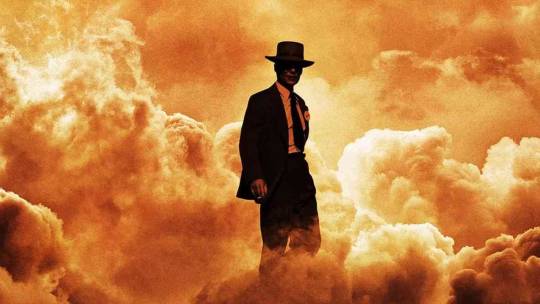
Prediction: Oppenheimer
It's highly doubtful that the Academy would not give the highest honor to Nolan's cinematic masterpiece of the year. Not doing so would lead to havoc.
Best Director
Nominees:
Justine Triet – Anatomy of a Fall
Martin Scorsese – Killers of the Flower Moon
Christopher Nolan – Oppenheimer
Yorgos Lanthimos – Poor Things
Jonathan Glazer – The Zone of Interest
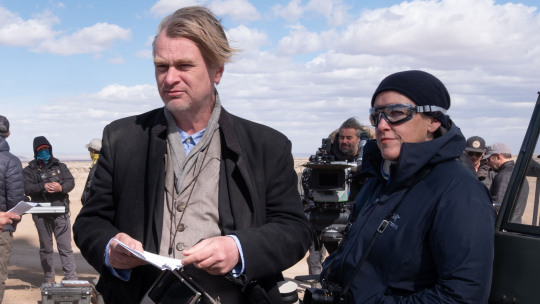
Prediction: Christopher Nolan
Nolan has given the ultimate blockbuster of the year - a period film with intense acting and technical excellence. It's time to make up for the snubs of the past.
Best Actor
Nominees:
Bradley Cooper – Maestro as Leonard Bernstein
Colman Domingo – Rustin as Bayard Rustin
Paul Giamatti – The Holdovers as Paul Hunham
Cillian Murphy – Oppenheimer as J. Robert Oppenheimer
Jeffrey Wright – American Fiction as Thelonious "Monk" Ellison

Prediction(s): Cillian Murphy
With his wins at the Golden Globe, BAFTA, and the SAG, it's time for the Irishman to get the golden man for his first role as a leading man in a Nolan (after playing supporting or character roles in movies like The Dark Night Trilogy, Inception, and Dunkirk).
Best Actress
Nominees:
Annette Bening – Nyad as Diana Nyad
Lily Gladstone – Killers of the Flower Moon as Mollie Burkhart
Sandra Hüller – Anatomy of a Fall as Sandra Voyter
Carey Mulligan – Maestro as Felicia Montealegre
Emma Stone – Poor Things as Bella Baxter
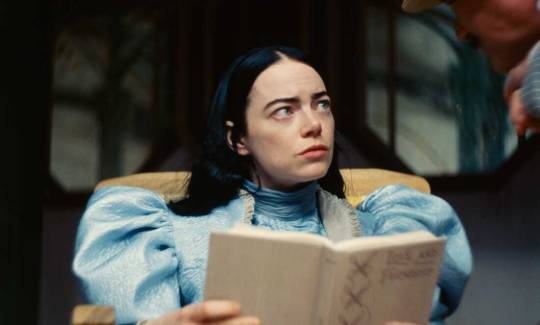

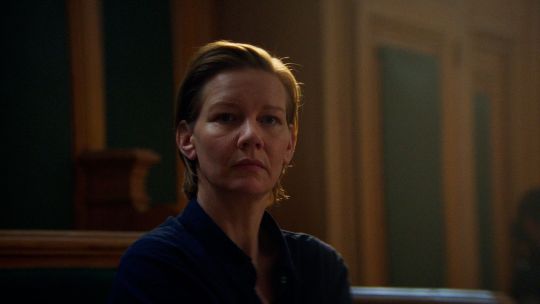
Prediction(s): Emma Stone/Lily Gladstone/Sandra Hüller
The competition for best actress is intense - as Gladstone has showcased her method acting (which might make her the first Native American to win the trophy). Meanwhile, Stone's feminist portrayal of a woman on her purpose to stand for equality and liberation seems Oscar-worthy (with her acting wins this year). Hüller, on the other hand, has given a breathtaking performance in the trilingual thriller.
Best Supporting Actor
Nominees:
Sterling K. Brown – American Fiction as Clifford "Cliff" Ellison
Robert De Niro – Killers of the Flower Moon as William King Hale
Robert Downey Jr. – Oppenheimer as Lewis Strauss
Ryan Gosling – Barbie as Ken
Mark Ruffalo – Poor Things as Duncan Wedderburn

Prediction(s): Robert Downey Jr
RDJ might be memorable for Tony Stark/Iron Man. However, it's his portrayal of Strauss that's going to win this year. With two previous nominations (including one for portraying Charlie Chaplin), RDJ would likely be the first Marvel hero to win the Golden Man. He would also repeat the feat of Actor-Supporting Actor wins for the same film - after 1959's Ben Hur (Charlton Heston - Charles Laughton), 2003's Mystic River (Sean Penn - Tim Robbins), and 2013's Dallas Buyers Club (Matthew McCoughnahey - Jared Leto).
Best Supporting Actress
Nominees:
Emily Blunt – Oppenheimer as Kitty Oppenheimer
Danielle Brooks – The Color Purple as Sofia
America Ferrera – Barbie as Gloria
Jodie Foster – Nyad as Bonnie Stoll
Da'Vine Joy Randolph – The Holdovers as Mary Lamb

Prediction(s): Da'Vine Joy Randolph
Randolph's portrayal of a grieving mother stuck in a boarding school during the holiday season involves her comedic timing and emotional depth.
Best Original Screenplay
Nominees:
Anatomy of a Fall – Justine Triet and Arthur Harari
The Holdovers – David Hemingson
Maestro – Bradley Cooper and Josh Singer
May December – Screenplay by Samy Burch; Story by Samy Burch and Alex Mechanik
Past Lives – Celine Song


Prediction(s): Anatomy of A Fall/The Holdovers
While the former is this year's Palme d'Or winner and Golden Globe-winning screenplay, the latter is what would become a holiday classic. It's going to be a tough contest between the two films.
Best Adapted Screenplay
Nominees:
American Fiction – Cord Jefferson; based on the novel Erasure by Percival Everett
Barbie – Greta Gerwig and Noah Baumbach; based on characters created by Ruth Handler
Oppenheimer – Christopher Nolan; based on the biography American Prometheus: The Triumph and Tragedy of J. Robert Oppenheimer by Kai Bird and Martin J. Sherwin
Poor Things – Tony McNamara; based on the novel by Alasdair Gray
The Zone of Interest – Jonathan Glazer; based on the novel by Martin Amis
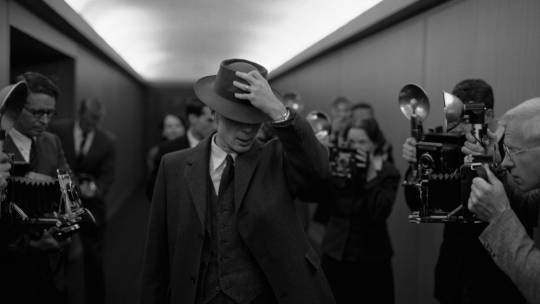

Prediction(s): Oppenheimer/American Fiction
The former might be possible with the guaranteed Best Picture & Director awards - which could make Nolan another director to win writing, directing, and producing Oscars. However, the latter would pose a tough competition - as it has already won the Writers Guild of America (WGA) Award, the Critics Choice Award, and several other precursor accolades. Its poignant exploration of race, family, and the American dream resonates with critics and audiences.
Best Animated Feature
Nominees:
The Boy and the Heron – Hayao Miyazaki and Toshio Suzuki
Elemental – Peter Sohn and Denise Ream
Nimona – Nick Bruno, Troy Quane, Karen Ryan, and Julie Zackary
Robot Dreams – Pablo Berger, Ibon Cormenzana, Ignasi Estapé, and Sandra Tapia Díaz
Spider-Man: Across the Spider-Verse – Kemp Powers, Justin K. Thompson, Phil Lord, Christopher Miller, and Amy Pascal


Prediction(s): Spider-Man: Across the Spider-Verse/The Boy and the Heron
It'll be Marvel's turn to preside over this category - with its innovative animation style, captivating story, and emotional connection. However, the Golden Globe-winning Japanese anime with a timeless tale of loss and resilience is a strong contender for the American animated film.
Best International Feature Film
Nominees:
Io capitano (Italy) – directed by Matteo Garrone
Perfect Days (Japan) – directed by Wim Wenders
Society of the Snow (Spain) – directed by J. A. Bayona
The Teachers' Lounge (Germany) – directed by İlker Çatak
The Zone of Interest (United Kingdom) – directed by Jonathan Glazer

Prediction(s): The Zone of Interest
The Grand Prix-winning tale of a Nazi leader's family living next to Auschwitz is a tale that will send chills down the spine.
Best Documentary Feature Film
Nominees:
Bobi Wine: The People's President – Moses Bwayo, Christopher Sharp, and John Battsek
The Eternal Memory – Maite Alberdi
Four Daughters – Kaouther Ben Hania and Nadim Cheikhrouha
To Kill a Tiger – Nisha Pahuja, Cornelia Principe, and David Oppenheim
20 Days in Mariupol – Mstyslav Chernov, Michelle Mizner, and Raney Aronson-Rath

Prediction(s): 20 Days in Mariupol
A tale about the Russian invasion of Ukraine, 20 Days in Mariupol has won several documentary awards at multiple film festivals and award ceremonies. If it wins, it would be another film about the dark side of Russia to win the Oscar.
Best Documentary Short Film
Nominees:
The ABCs of Book Banning – Sheila Nevins and Trish Adlesic
The Barber of Little Rock – John Hoffman and Christine Turner
Island in Between – S. Leo Chiang and Jean Tsien
The Last Repair Shop – Ben Proudfoot and Kris Bowers
Nǎi Nai & Wài Pó – Sean Wang and Sam Davis

Prediction(s): The Last Repair Shop
Showing Los Angeles as one of the few United States cities to offer and fix musical instruments for its public school students at no cost, it might win the Oscar - as it has previously won the Critics Choice Documentary Award for the same category.
Best Live Action Short Film
Nominees:
The After – Misan Harriman and Nicky Bentham
Invincible – Vincent René-Lortie and Samuel Caron
Knight of Fortune – Lasse Lyskjær Noer and Christian Norlyk
Red, White and Blue – Nazrin Choudhury and Sara McFarlane
The Wonderful Story of Henry Sugar – Wes Anderson and Steven Rales
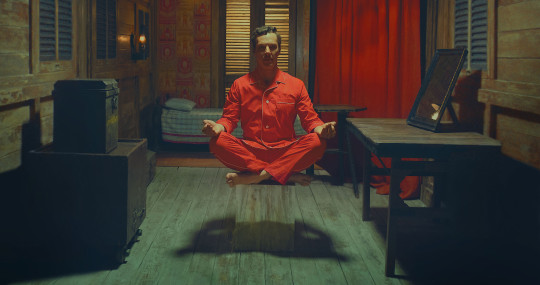
Prediction(s): The Wonderful Story of Henry Sugar
I guess it's time for Anderson to win his Oscar now - with his colors, symmetry, and star cast.
Best Animated Short Film
Nominees:
Letter to a Pig – Tal Kantor and Amit R. Gicelter
Ninety-Five Senses – Jared and Jerusha Hess
Our Uniform – Yegane Moghaddam
Pachyderme – Stéphanie Clément and Marc Rius
War Is Over! Inspired by the Music of John and Yoko – Dave Mullins and Brad Booker

Prediction(s): War Is Over! Inspired by the Music of John and Yoko
Inspired by and featuring John Lennon and Yoko Ono's peace anthem "Happy Xmas (War Is Over)," It is a simplistic take on war and humanity - which the Academy might honor.
Best Original Score
Nominees:
American Fiction – Laura Karpman
Indiana Jones and the Dial of Destiny – John Williams
Killers of the Flower Moon – Robbie Robertson †
Oppenheimer – Ludwig Göransson
Poor Things – Jerskin Fendrix
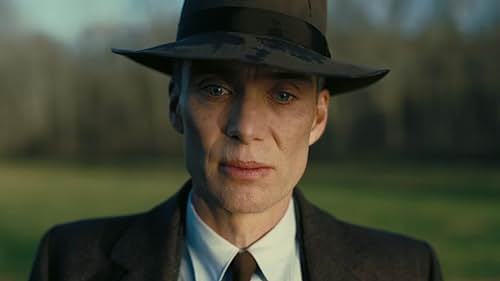
Prediction: Oppenheimer
With his 54th nomination (and final because of his retirement), John Williams has entertained with his latest rendition of one of Hollywood's greatest film franchises. However, Goransson's Oppenheimer soundtrack adds tension to the film's plot - particularly with "Can You Hear the Music?" He can easily add an Oscar to his collection of Awards for Oppenheimer.
Best Original Song
Nominees:
"The Fire Inside" from Flamin' Hot – Music and lyrics by Diane Warren
"I'm Just Ken" from Barbie – Music and lyrics by Mark Ronson and Andrew Wyatt
"It Never Went Away" from American Symphony – Music and lyrics by Jon Batiste and Dan Wilson
"Wahzhazhe (A Song for My People)" from Killers of the Flower Moon – Music and lyrics by Scott George
"What Was I Made For?" from Barbie – Music and lyrics by Billie Eilish and Finneas O'Connell
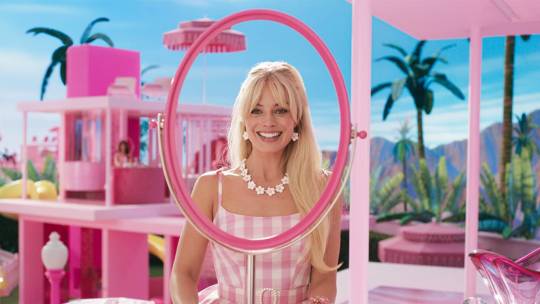
Prediction: What Was I Made For?
It's likely a second win for the Eilish-O'Connell siblings - after No Time to Die.
Best Sound
Nominees:
The Creator – Ian Voigt, Erik Aadahl, Ethan Van der Ryn, Tom Ozanich, and Dean Zupancic
Maestro – Steven A. Morrow, Richard King, Jason Ruder, Tom Ozanich, and Dean Zupancic
Mission: Impossible – Dead Reckoning Part One – Chris Munro, James H. Mather, Chris Burdon, and Mark Taylor
Oppenheimer – Willie Burton, Richard King, Gary A. Rizzo, and Kevin O'Connell
The Zone of Interest – Tarn Willers and Johnnie Burn

Prediction: Oppenheimer
It's Nolan's year when it comes to technical awards. The sound design and editing show that Nolan has duly followed the laws of physics - and ensured tension in the other scenes.
Best Production Design
Nominees:
Barbie – Production Design: Sarah Greenwood; Set Decoration: Katie Spencer
Killers of the Flower Moon – Production Design: Jack Fisk; Set Decoration: Adam Willis
Napoleon – Production Design: Arthur Max; Set Decoration: Elli Griff
Oppenheimer – Production Design: Ruth De Jong; Set Decoration: Claire Kaufman
Poor Things – Production Design: James Price and Shona Heath; Set Decoration: Zsuzsa Mihalek


Prediction(s): Barbie/Poor Things
Fantasy films have eye-grabbing sets and decorations that are attractive to the Academy voters. It can be either of the two women-centric films.
Best Cinematography
Nominees:
El Conde – Edward Lachman
Killers of the Flower Moon – Rodrigo Prieto
Maestro – Matthew Libatique
Oppenheimer – Hoyte van Hoytema
Poor Things – Robbie Ryan
Prediction(s): Oppenheimer

Hoytema's camerawork captures expansive desert vistas and painfully intimate close-ups using IMAX film cameras (in color and monochrome). A win for him is confirmed
Best Makeup and Hairstyling
Nominees:
Golda – Karen Hartley Thomas, Suzi Battersby, and Ashra Kelly-Blue
Maestro – Kazu Hiro, Kay Georgiou, and Lori McCoy-Bell
Oppenheimer – Luisa Abel
Poor Things – Nadia Stacey, Mark Coulier, and Josh Weston
Society of the Snow – Ana López-Puigcerver, David Martí, and Montse Ribé

Prediction(s): Maestro
Although other movies have dominated the major categories, a Bradly Cooper film can win an Oscar this year - with the magnificent transformation of the lead actor into Leonard Bernstein.
Best Costume Designing
Nominees:
Barbie – Jacqueline Durran
Killers of the Flower Moon – Jacqueline West
Napoleon – Janty Yates and Dave Crossman
Oppenheimer – Ellen Mirojnick
Poor Things – Holly Waddington
Prediction(s): Barbie/Poor Things

Like many fantasy films, it's a tough pick between the two films in costumes - like the production design category.
Best Film Editing
Nominees:
Anatomy of a Fall – Laurent Sénéchal
The Holdovers – Kevin Tent
Killers of the Flower Moon – Thelma Schoonmaker
Oppenheimer – Jennifer Lame
Poor Things – Yorgos Mavropsaridis

Prediction(s): Oppenheimer
It goes with saying for the technical awards and Nolan - with the montages, parallel storytelling, and transitions that accompany the screenplay.
Best Visual Effects
Nominees:
The Creator – Jay Cooper, Ian Comley, Andrew Roberts, and Neil Corbould
Godzilla Minus One – Takashi Yamazaki, Kiyoko Shibuya, Masaki Takahashi, and Tatsuji Nojima
Guardians of the Galaxy Vol. 3 – Stéphane Ceretti, Alexis Wajsbrot, Guy Williams, and Theo Bialek
Mission: Impossible – Dead Reckoning Part One – Alex Wuttke, Simone Coco, Jeff Sutherland, and Neil Corbould
Napoleon – Charley Henley, Luc-Ewen Martin-Fenouillet, Simone Coco, and Neil Corbould
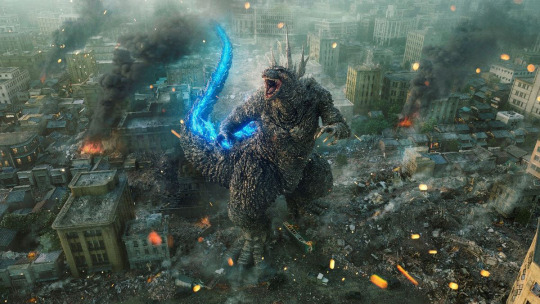
Prediction: Godzilla Minus One
I'm deeply offended that Oppenheimer didn't get a nomination in this category. However, with the nominees, I'd have to pick Godzilla - with its first-ever nomination in the franchise - and also because it is a visual spectacle besides Oppenheimer this year.
That's all for now. Let's see who wins what this year. See you at the Oscars.
0 notes
Text
'“Oppenheimer” has surged ahead of its competition, potentially becoming one of the most dominant Oscar winners since “Slumdog Millionaire” (2008), which garnered eight statuettes. Looking at the state of the race post-nominations, the Universal Pictures’ blockbuster could make an even bigger impact.
Christopher Nolan’s historical drama about the father of the Atomic bomb leads the tally with 13, making it the 11th movie to reach such a gargantuan Oscars nomination count. Six of the previous 10 films scored best picture wins, including classics like “Gone with the Wind” (1939), “Forrest Gump” (1994), and “The Shape of Water” (2017). The four that lost are “Mary Poppins” (1964), “Who’s Afraid of Virginia Woolf?” (1966), “The Lord of the Rings: The Fellowship of the Ring” (2001), and “The Curious Case of Benjamin Button” (2008), none of which were heavily favored to triumph in their respective years. But that’s probably not the fate of “Oppenheimer,” particularly after its victories at the Golden Globes and Critics Choice Awards ceremonies.
And lets consider the other “Oppen-homies.” Robert Downey Jr. is in the pole position to be named best supporting actor for his portrayal of the slimy bureaucrat Lewis Strauss. After winning the Critics Choice Award and the Golden Globe, and with two previous nominations for “Chaplin” (1992) and “Tropic Thunder” (2008), he’s clearly the favorite However, it isn’t entirely sealed for him yet...
On paper, Yorgos Lanthimos’ sci-fi fantasy comedy “Poor Things” appears to be the most formidable challenger to Nolan’s frontrunning epic. It scored 11 nominations...
The morning’s biggest shocker was probably that “Barbie” creator Greta Gerwig and her star Margot Robbie were overlooked in the best director and actress races. However, both received individual nominations, with Gerwig getting recognized in the adapted screenplay category and Robbie in best picture as a producer. The movie’s screenplay once seemed like it could bring Gerwig her first statue, but with “American Fiction” winning the Critics Choice Award and “Oppenheimer” and “Poor Things” performing strongly, that may not come to pass...
“Holdovers” star Da’Vine Joy Randolph has emerged as the darling of the season, winning the most precursor awards. Her co-star, Paul Giamatti, will be a formidable challenger for best actor after winning the Critics Choice Award and the Golden Globe for lead comedy actor. With only one previous nomination for “Cinderella Man” (2005), Giamatti, at 56, commands great respect and support from his peers, positioning the veteran actor for a potential win at the Dolby Theatre. However, he faces competition from Cillian Murphy from “Oppenheimer” and Bradley Cooper from “Maestro,” both of whom give transformative performances that could be impossible to ignore...
Here’s my initial gut-check about the ultimate winners list:
Best Picture: “Oppenheimer”
Directing: Christopher Nolan, “Oppenheimer”
Actor: Paul Giamatti, “The Holdovers”
Supporting Actor: Robert Downey Jr, “Oppenheimer”
Supporting Actress: Da’Vine Joy Randolph, “The Holdovers”
Adapted Screenplay: “American Fiction”
Production Design: “Barbie”
Cinematography: “Oppenheimer”
Costume Design: “Barbie”
Film Editing: “Oppenheimer”
Makeup and Hairstyling: “Maestro”
Sound: “Oppenheimer”
Original Score: “Oppenheimer”...'
#Oscars#Oppenheimer#Christopher Nolan#Golden Globes#Critics Choice Awards#Robert Downey Jr.#Lewis Strauss#Cillian Murphy#Bradley Cooper#Maestro#Paul Giamatti#The Holdovers#Barbie#Greta Gerwig#Margot Robbie#Yorgos Lanthimos#Poor Things#Da'Vine Joy Randolph#American Fiction
0 notes
Text
2023 Movies You Need to Watch (Part Two)
Hi there, I’m sorry that I lied, I’m back now and everything is okay! I will be posting a review of Percy Jackson this Friday, but today we are going to finish this and get back on schedule.
Mission Impossible: Dead Reckoning (Released July 12th)
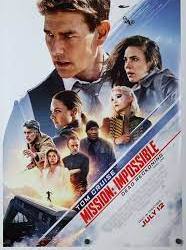
(Credit: Amazon)
Starring: Tom Cruise, Haley Atwell, Ving Rhames, Simon Pegg
Director: Christopher McQuarrie
I have loved the Mission Impossible series since the beginning, and this is no exception. Tom Cruise still has it as Ethan Hunt. This movie plays around with the real threat of AI, which scared President Biden. This movie is the perfect way to showcase just how terrifying AI can be, while also being a fun action packed movie.
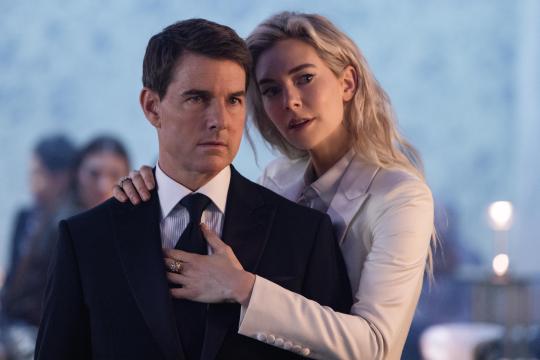
(Credit: IMDb)
This movie will leave you gripping on your arm rest as you watch the intense thriller portions. While I may not be a fan of Haley Atwell’s character (and she is in here a lot), I can overlook that for more Benji (love him) and the other characters. I cannot wait for the sequel to come out, but until then, I’ll be patiently waiting.
Barbie (Released July 21st)

(Credit: Microsoft)
Starring: Margot Robbie, Ryan Gosling, America Ferrera, Kate McKinnon
Director: Greta Gerwig
Now, onto the powerhouses of the summer. First, I want to talk about Barbie, which I watched second after Oppenheimer. Barbie was an amazing movie! I loved everything about it. From the perfect Barbie and Ken castings to the story of Barbie learning about the real world was something I didn't know I needed.

(Credit: Deadline)
I have been a woman studies student for a while, and this movie literally answers everything that we discuss in our classes. I remember taking my boyfriend to watch this during the iMAX rerelease, and he cried during the montage part, and he squeezed my hand. He loves the movie, I love the movie, it’s great.
Oppenheimer (Released July 21st)
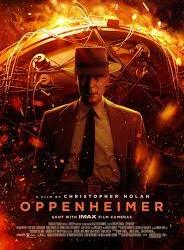
(Credit: IMDb)
Starring: Cillian Murphy, Emily Blunt, Matt Damon, Robert Downey Jr.
Director: Christopher Nolan
Oh, Oppenheimer. What a powerhouse. Fun fact, I did a History research project on Oppenheimer with two other classmates. We won our county’s competition. My portion was on the aftermath of the bombings, which included the Strauss’ hearings and the security clearance meetings. This movie was a masterpiece, visually, musically, every aspect was created with such care.
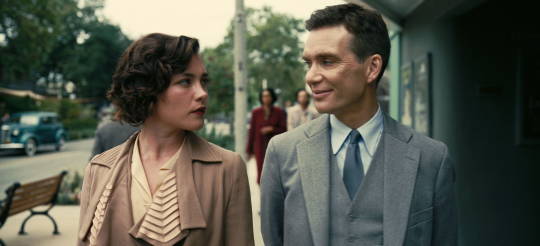
(Credit: The Lantern)
And to everyone who thinks this movie is pro bomb, rewatch it. I promise you it is not. If you rewatch it and still come to that conclusion, I don’t know how much else to tell you than...you're dumb, I don’t know. Another fun fact, the first time I watched this, a guy gave me COVID.
Blue Beetle (Released August 18th)

(Credit: IMDb)
Starring: Xolo Maridueña, Adriana Barraza, Damián Alcázar, Elpidia Carrillo
Director: Angel Manuel Soto
Blue Beetle, the beginning of the James Gunn led DC Universe. Honestly, this is a great one to start on. Sure, it is a little predictable with the plot, what really sells it is Jaime (Xolo Maridueña) and his relationship with his family. This movie would not be what it is if it were not for the supporting casts’ relationship with Maridueña.
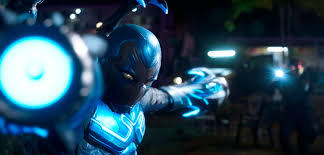
(Credit: The Washington Post)
Maridueña also excels in this role as Jaime. I haven’t watched Cobra Kai, which is what he is known for, but I am completely sold on him just from this performance alone. He becomes the hero that not only his family needs, but the DC universe. I am disappointed it didn’t do as well as it deserved, so if you haven’t watched it yet, WATCH IT!
Five Nights at Freddy’s (Released October 27th)
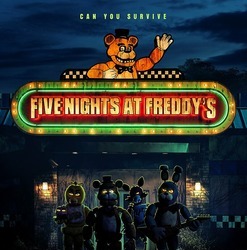
(Credit: Wikipedia)
Starting: Josh Hutcherson, Elizabeth Lail, Piper Rubio, Mary Stuart
Director: Emma Tammi
Oh my gods, Five Nights at Freddy’s. I have loved the series since its release in 2014, which is where I was introduced to Markiplier. So, since I was a big fan of the game, I have been waiting for an adaptation forever. Honestly though, I was concerned as to how they were going to do it, since there wasn’t really a cinematic story when it came to the first game. I mean, the first Game Theory video on Five Nights at Freddy, MatPat linked it to a real Chuck E Cheese Massacre. What they came up with was not what I was expecting in the best way possible.
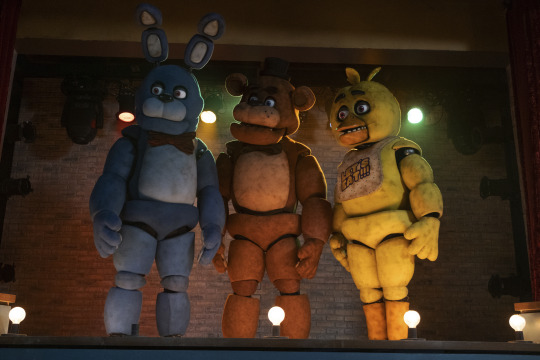
(Credit: AP News)
This was a crazy ass movie, and it needed to be. Also, love that Living Tombstones had their song in the credits, I still listen to that song to this day. Along with that, Josh Hutcherson is amazing in this movie, carrying it, and my favorite, Matthew Lillard, steals the show. One critique I must say is that I wish they didn’t share that he was Purple Guy, honestly. Seeing the reveal would have been incredible, and with him saying his iconic line, it was a masterpiece.
The Boy and the Heron (Released December 8th)
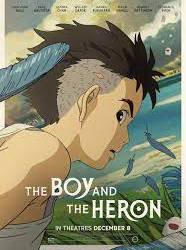
(Credit: IMDb)
Starting: Luca Padovan, Robert Pattinson, Karen Fukuhara, Gemma Chan
Director: Hayao Miyazaki
The Boy and the Heron is one of, if not, the best animated film of the year. I love it so much, and hope to one day watch the sub version. This is an amazing story that shows the journey of a boy going through life in the wake of his mother’s passing. He ventures into a mysterious realm to save his stepmother. I love Miyazaki films, and this is no exception.

(Credit: IGN)
He brings it in this film, especially casting Robert Pattinson as the titular Heron for the English dub. If nobody told me that it was Pattinson, I would not be able to tell. This movie relies on many different characters and the way they interact with the titular Boy, Mahito. It is honestly a joy to watch, and while it is a little jarring to hear some familiar voices in there, it doesn’t take you out of the movie.
Okay, I have some more movies, but we will do a quick Honorable Mention thing.
Honorable Mention Quick Round
Leave the World Behind
This Netflix movie is a must watch for those who are reliant on technology. This movie shows just what might happen when America falls victim to a cyberattack.
Fast X
This series never ceases to catch my attention. While this installment might be weaker than ones before it, I believe it is still an entertaining movie that will keep you entertained.
The Marvels
The latest movie in the MCU was a fun, action packed film. Iman Vallani is a standout in this movie, carrying it on her shoulders. It was also nice to see Zawe Ashton, Tom Hiddleston’s fiancee, in a role.
Air
This movie based on the Air Jordan shoes is an interesting movie that showed the legacy of the shoe that became one of the best selling shoes in the world. I would give this another watch on a rainy day.
Quiz Lady
This straight to Hulu movie brings Awkwafina and Sandra Oh as sisters trying to get their dog back by going on a quiz show. This is a cute movie, which especially shows just how far siblings are willing to go for one another.
Indiana Jones and the Dial of Destiny
Indiana Jones’ latest adventure was an action filled, well, adventure. I really enjoyed it, but this movie also suffered from an unlikeable sidekick in the form of Phoebe Waller-Bridges character.
The Iron Claw
A heartbreaking movie that I had known nothing about going in, and I was devastated by the end, crying until I had no more tears to give. Also, Zac Efron is unrecognizable in the role as Kevin Von Erich. Best role he has ever done, in my opinion.
Well, thanks for reading! I’m sorry it took me so long to get this out, but I am back now and I will make sure to meet my deadlines this time. This Friday is Percy Jackson and for the time being, I will be doing Wednesday and Friday releases, and it will literally be whatever I feel like writing about.
#screenandjoystick#movies#mission impossible#barbie 2023#oppenheimer#blue beetle#fnaf movie#boy and the heron#2023 movies
1 note
·
View note
Text
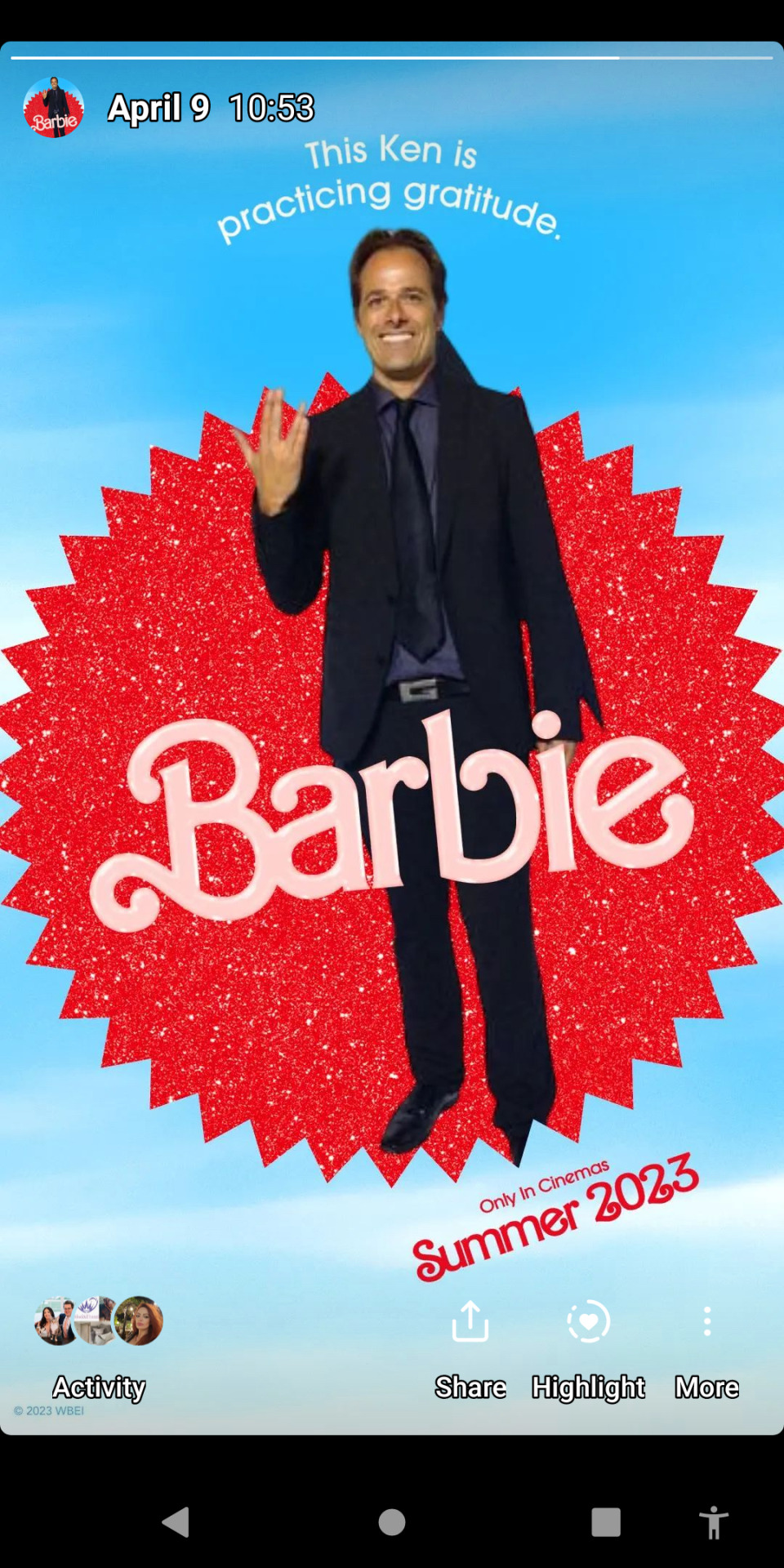
Award Season is among us. Our reviewer Actor, Producer and Journalist Alex von Roon can't wait to check out the contenders starting off with HBO' s "Succession". How do you like Alexander as "Ken" in the Hit Movie "Barbie"? Von Roon did work with the director before and enjoyed her performance in "Greenberg"
For "Bild am Sonntag" Alex also met SAG Award nominee Tony Shalhoub on set in his trailer. Some comments were very interesting. We wonder how Mr. Monk would deal with a pandemic such as Corona.
Below please find the complete list of nominations courtesy of SAGAFTRA. Which are your favorites? Comment below.
All rights reserved.
SAG AWARDS NOMINATIONS 2024
The Motion Picture Nominees are:
Outstanding Performance by a Male Actor in a Leading Role BRADLEY COOPER / Leonard Bernstein - "MAESTRO" COLMAN DOMINGO / Bayard Rustin - "RUSTIN" PAUL GIAMATTI / Paul Hunham - "THE HOLDOVERS" CILLIAN MURPHY / J. Robert Oppenheimer - "OPPENHEIMER" JEFFREY WRIGHT / Thelonious "Monk" Ellison - "AMERICAN FICTION"
Outstanding Performance by a Female Actor in a Leading Role ANNETTE BENING / Diana Nyad - "NYAD" LILY GLADSTONE / Mollie Burkhart - "KILLERS OF THE FLOWER MOON" CAREY MULLIGAN / Felicia Montealegre - "MAESTRO" MARGOT ROBBIE / Barbie - "BARBIE" EMMA STONE / Bella Baxter - "POOR THINGS"
Outstanding Performance by a Male Actor in a Supporting Role STERLING K. BROWN / Clifford Ellison - "AMERICAN FICTION" WILLEM DAFOE / Godwin Baxter - "POOR THINGS" ROBERT DE NIRO / William Hale - "KILLERS OF THE FLOWER MOON" ROBERT DOWNEY JR. / Lewis Strauss - "OPPENHEIMER" RYAN GOSLING / Ken - "BARBIE"
Outstanding Performance by a Female Actor in a Supporting Role EMILY BLUNT / Kitty Oppenheimer - "OPPENHEIMER" DANIELLE BROOKS / Sofia - "THE COLOR PURPLE" PENÉLOPE CRUZ / Laura Ferrari - "FERRARI" JODIE FOSTER / Bonnie Stoll - "NYAD" DA’VINE JOY RANDOLPH / Mary Lamb - "THE HOLDOVERS"
Outstanding Performance by a Cast in a Motion Picture AMERICAN FICTION ERIKA ALEXANDER / Coraline ADAM BRODY / Wiley Valdespino STERLING K. BROWN / Clifford Ellison KEITH DAVID / Willy the Wonker JOHN ORTIZ / Arthur ISSA RAE / Sintara Golden TRACEE ELLIS ROSS / Lisa Ellison LESLIE UGGAMS / Agnes Ellison JEFFREY WRIGHT / Thelonious "Monk" Ellison
BARBIE MICHAEL CERA / Allan WILL FERRELL / Mattel CEO AMERICA FERRERA / Gloria RYAN GOSLING / Ken ARIANA GREENBLATT / Sasha KATE MCKINNON / Barbie HELEN MIRREN / Narrator RHEA PERLMAN / Ruth ISSA RAE / Barbie MARGOT ROBBIE / Barbie
THE COLOR PURPLE HALLE BAILEY / Young Nettie FANTASIA BARRINO / Celie JON BATISTE / Grady DANIELLE BROOKS / Sofia CIARA / Nettie COLMAN DOMINGO / Mister AUNJANUE ELLIS-TAYLOR / Mama LOUIS GOSSETT, JR. / Ol' Mister COREY HAWKINS / Harpo TARAJI P. HENSON / Shug Avery PHYLICIA PEARL MPASI / Young Celie GABRIELLA WILSON "H.E.R." / Squeak
KILLERS OF THE FLOWER MOON TANTOO CARDINAL / Lizzie Q ROBERT DE NIRO / William Hale LEONARDO DICAPRIO / Ernest Burkhart BRENDAN FRASER / W.S. Hamilton LILY GLADSTONE / Mollie Burkhart JOHN LITHGOW / Prosecutor Peter Leaward JESSE PLEMONS / Tom White
OPPENHEIMER CASEY AFFLECK / Boris Pash EMILY BLUNT / Kitty Oppenheimer KENNETH BRANAGH / Niels Bohr MATT DAMON / Leslie Groves ROBERT DOWNEY JR. / Lewis Strauss JOSH HARTNETT / Ernest Lawrence RAMI MALEK / David Hill CILLIAN MURPHY / J. Robert Oppenheimer FLORENCE PUGH / Jean Tatlock
The Television Program Nominees are:
Outstanding Performance by a Male Actor in a Television Movie or Limited Series MATT BOMER / Hawkins "Hawk" Fuller - "FELLOW TRAVELERS" JON HAMM / Roy Tillman - "FARGO" DAVID OYELOWO / Bass Reeves - "LAWMEN: BASS REEVES" TONY SHALHOUB / Adrian Monk - "MR. MONK'S LAST CASE: A MONK MOVIE" STEVEN YEUN / Danny Cho - "BEEF"
Outstanding Performance by a Female Actor in a Television Movie or Limited Series UZO ADUBA / Edie Flowers - "PAINKILLER" KATHRYN HAHN / Clare Pierce - "TINY BEAUTIFUL THINGS" BRIE LARSON / Elizabeth Zott - "LESSONS IN CHEMISTRY" BEL POWLEY / Miep Gies - "A SMALL LIGHT" ALI WONG / Amy Lau - "BEEF"
Outstanding Performance by a Male Actor in a Drama Series BRIAN COX / Logan Roy - "SUCCESSION" BILLY CRUDUP / Cory Ellison - "THE MORNING SHOW" KIERAN CULKIN / Roman Roy - "SUCCESSION" MATTHEW MACFADYEN / Tom Wambsgans - "SUCCESSION" PEDRO PASCAL / Joel - "THE LAST OF US"
Outstanding Performance by a Female Actor in a Drama Series JENNIFER ANISTON / Alex Levy - "THE MORNING SHOW" ELIZABETH DEBICKI / Princess Diana - "THE CROWN" BELLA RAMSEY / Ellie - "THE LAST OF US" KERI RUSSELL / Kate Wyler - "THE DIPLOMAT" SARAH SNOOK / Shiv Roy - "SUCCESSION"
Outstanding Performance by a Male Actor in a Comedy Series BRETT GOLDSTEIN / Roy Kent - "TED LASSO" BILL HADER / Barry - "BARRY" EBON MOSS-BACHRACH / Richard "Richie" Jerimovich - "THE BEAR" JASON SUDEIKIS / Ted Lasso - "TED LASSO" JEREMY ALLEN WHITE / Carmen "Carmy" Berzatto - "THE BEAR"
Outstanding Performance by a Female Actor in a Comedy Series ALEX BORSTEIN / Susie Myerson - "THE MARVELOUS MRS. MAISEL" RACHEL BROSNAHAN / Miriam "Midge" Maisel - "THE MARVELOUS MRS. MAISEL" QUINTA BRUNSON / Janine Teagues - "ABBOTT ELEMENTARY" AYO EDEBIRI / Sydney Adamu - "THE BEAR" HANNAH WADDINGHAM / Rebecca Welton - "TED LASSO"
Outstanding Performance by an Ensemble in a Drama Series
THE CROWN KHALID ABDALLA / Dodi Fayed SEBASTIAN BLUNT / Prince Edward BERTIE CARVEL / Tony Blair SALIM DAW / Mohamed Al Fayed ELIZABETH DEBICKI / Princess Diana LUTHER FORD / Prince Harry CLAUDIA HARRISON / Princess Anne LESLEY MANVILLE / Princess Margaret ED MCVEY / Prince William JAMES MURRAY / Prince Andrew JONATHAN PRYCE / Prince Philip, Duke of Edinburgh IMELDA STAUNTON / Queen Elizabeth II MARCIA WARREN / Queen Elizabeth the Queen Mother DOMINIC WEST / Prince Charles OLIVIA WILLIAMS / Camilla Parker Bowles
THE GILDED AGE BEN AHLERS / Jack ASHLIE ATKINSON / Mamie Fish CHRISTINE BARANSKI / Agnes van Rhijn DENÉE BENTON / Peggy Scott NICOLE BRYDON BLOOM / Maud Beaton MICHAEL CERVERIS / Watson CARRIE COON / Bertha Russell KELLEY CURRAN / Mrs. Winterton TAISSA FARMIGA / Gladys Russell DAVID FURR / Dashiell Montgomery JACK GILPIN / Church WARD HORTON / Charles Fane LOUISA JACOBSON / Marian Brook SIMON JONES / Bannister SULLIVAN JONES / T. Thomas Fortune CELIA KEENAN-BOLGER / Mrs. Bruce NATHAN LANE / Ward McAllister MATILDA LAWLER / Frances Montgomery ROBERT SEAN LEONARD / Luke Forte AUDRA MCDONALD / Dorothy Scott DEBRA MONK / Armstrong DONNA MURPHY / Mrs. Astor KRISTINE NIELSEN / Mrs. Bauer CYNTHIA NIXON / Ada Brook KELLI O'HARA / Aurora Fane PATRICK PAGE / Richard Clay HARRY RICHARDSON / Larry Russell TAYLOR RICHARDSON / Bridget BLAKE RITSON / Oscar van Rhijn JEREMY SHAMOS / Mr. Gilbert DOUGLAS SILLS / Borden MORGAN SPECTOR / George Russell JOHN DOUGLAS THOMPSON / Arthur Scott ERIN WILHELMI / Adelheid
THE LAST OF US PEDRO PASCAL / Joel BELLA RAMSEY / Ellie
THE MORNING SHOW JENNIFER ANISTON / Alex Levy NICOLE BEHARIE / Christina Hunter SHARI BELAFONTE / Julia NESTOR CARBONELL / Yanko Flores BILLY CRUDUP / Cory Ellison MARK DUPLASS / Chip Black JON HAMM / Paul Marks THEO IYER / Kyle HANNAH LEDER / Isabella GRETA LEE / Stella Bak JULIANNA MARGULIES / Laura Peterson TIG NOTARO / Amanda Robinson KAREN PITTMAN / Mia Jordan REESE WITHERSPOON / Bradley Jackson
SUCCESSION NICHOLAS BRAUN / Greg Hirsch JULIANA CANFIELD / Jess Jordan BRIAN COX / Logan Roy KIERAN CULKIN / Roman Roy DAGMARA DOMINCZYK / Karolina Novotney PETER FRIEDMAN / Frank Vernon JUSTINE LUPE / Willa MATTHEW MACFADYEN / Tom Wambsgans ARIAN MOAYED / Stewy Hosseini SCOTT NICHOLSON / Colin Stiles DAVID RASCHE / Karl Muller ALAN RUCK / Connor Roy ALEXANDER SKARSGÅRD / Lukas Matsson J. SMITH-CAMERON / Gerri Kellman SARAH SNOOK / Shiv Roy FISHER STEVENS / Hugo Baker JEREMY STRONG / Kendall Roy ZOË WINTERS / Kerry Castellabate
Outstanding Performance by an Ensemble in a Comedy Series ABBOTT ELEMENTARY QUINTA BRUNSON / Janine Teagues WILLIAM STANFORD DAVIS / Mr. Johnson JANELLE JAMES / Ava Coleman CHRIS PERFETTI / Jacob Hill SHERYL LEE RALPH / Barbara Howard LISA ANN WALTER / Melissa Schemmenti TYLER JAMES WILLIAMS / Gregory Eddie
BARRY ANTHONY CARRIGAN / NoHo Hank SARAH GOLDBERG / Sally Reed ZACHARY GOLINGER / John BILL HADER / Barry ANDRE HYLAND / Jason ANDREW LEEDS / Leo Cousineau FRED MELAMED / Tom Posorro CHARLES PARNELL / DA Buckner STEPHEN ROOT / Monroe Fuches TOBIE WINDHAM / Damian HENRY WINKLER / Gene Cousineau ROBERT WISDOM / Jim Moss
THE BEAR LIONEL BOYCE / Marcus JOSE CERVANTES JR. / Angel LIZA COLÓN-ZAYAS / Tina AYO EDEBIRI / Sydney Adamu ABBY ELLIOTT / Natalie “Sugar” Berzatto RICHARD ESTERAS / Manny EDWIN LEE GIBSON / Ebraheim MOLLY GORDON / Claire COREY HENDRIX / Sweeps MATTY MATHESON / Neil Fak EBON MOSS-BACHRACH / Richard "Richie" Jerimovich OLIVER PLATT / Jimmy "Cicero" Kalinowski JEREMY ALLEN WHITE / Carmen "Carmy" Berzatto
ONLY MURDERS IN THE BUILDING GERALD CAESAR / Ty MICHAEL CYRIL CREIGHTON / Howard Morris LINDA EMOND / Donna SELENA GOMEZ / Mabel Mora ALLISON GUINN / K.T. STEVE MARTIN / Charles-Haden Savage ASHLEY PARK / Kimber DON DARRYL RIVERA / Bobo PAUL RUDD / Ben Glenroy JEREMY SHAMOS / Dickie Glenroy MARTIN SHORT / Oliver Putnam MERYL STREEP / Loretta Durkin WESLEY TAYLOR / Cliff JASON VEASEY / Jonathan JESSE WILLIAMS / Tobert
TED LASSO ANNETTE BADLAND / Mae Green KOLA BOKINNI / Isaac McAdoo EDYTA BUDNIK / Jade ADAM COLBORNE / Baz Primrose PHIL DUNSTER / Jamie Tartt CRISTO FERNÁNDEZ / Dani Rojas KEVIN "KG" GARRY / Paul La Fleur BRETT GOLDSTEIN / Roy Kent BILLY HARRIS / Colin Hughes ANTHONY HEAD / Rupert Mannion BRENDAN HUNT / Coach Beard TOHEEB JIMOH / Sam Obisanya JAMES LANCE / Trent Crimm NICK MOHAMMED / Nathan Shelley JASON SUDEIKIS / Ted Lasso JEREMY SWIFT / Leslie Higgins JUNO TEMPLE / Keeley Jones HANNAH WADDINGHAM / Rebecca Welton BRONSON WEBB / Jeremy Blumenthal KATY WIX / Barbara
The Stunt Ensemble Honors Nominees are: Outstanding Action Performance by a Stunt Ensemble in a Motion Picture BARBIE GUARDIANS OF THE GALAXY VOL. 3 INDIANA JONES AND THE DIAL OF DESTINY JOHN WICK: CHAPTER 4 MISSION: IMPOSSIBLE - DEAD RECKONING PART ONE
Outstanding Action Performance by a Stunt Ensemble in a Television Series AHSOKA BARRY BEEF THE LAST OF US THE MANDALORIAN
#acting#sagawards#alexvonroon#sagaftra#barbie#oppenheimer#succession#hbo#hbo max#award shows#producing#make up#television#film#streaming#stunt ensemble#monk#Tony Shalhoub
0 notes